#Hatice Sultan (Daughter of Hafsa)
Explore tagged Tumblr posts
Note
Maybe you've done this but the bracelet Valide Sultan gives Hurrem after Bayezid is born is seen in Hatice as a sort of forehead band earlier on
Thank you. I actually haven't posted it yet but I do have it cataloged. I'll make a proper post eventually but for now I hope this will do. Btw are you sure it's Bayezid's birth? I thought it was Selim's.


Hatice first wears the bracelet as a headband in the sixteenth episode of the first season and Hürrem receives it from Hafsa in the first episode of the second season.
#Magnificent Century#Muhteşem Yüzyıl#period drama#costume drama#historical drama#Hatice Sultan#Hatice Sultan (Daughter of Hafsa)#Hürrem Sultan#Hurrem Sultan#recycled jewellery#reused jewellery
15 notes
·
View notes
Text
Mistakes in Magnificent Century part I
In part I I would like to speak about mistakes they made while writing characters. Their ages, titles, origins etc.
Let's start with Ayse Hafsa Sultan:
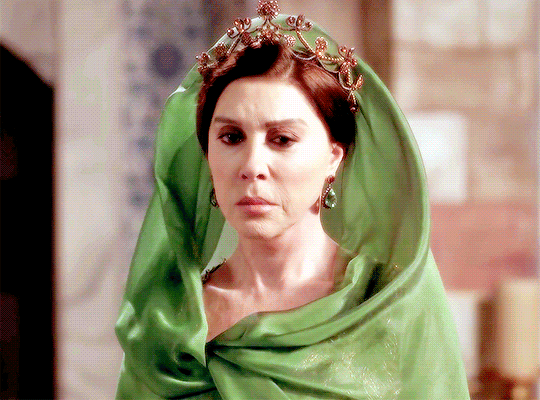
Several things about her were done wrong. First of all, She was not Crimean princess. There are two possibilities that although contradicts one another counters her royal origin. 1. There was another concubine named Ayse,who was daughter of Crimean khan, while she was called Ayse Hafsa for that reason 2.( I agree with that possibility more ) there was no concubine from Crimean family Sultan Bayazid would never let Selim, who was not his favourite, to gain such allie, nor would khan of Crimea risk to marry her daughter to non-favoired prince. Besides, Selim did not have much of a support from Crimea during his Rebellion.
As we more or less agreed that Ayse Hafsa was not Crimean, now we have to agree on where she was from. Legendary mother of the Magnificent sultan was actually converted slave of Caucasian origin, therefore she was either Circassian or Georgian.
Third thing about her is her title. Screenwriters both demoted and promoted her in this case. She was not "Valide Sultan" as we know today, first holder of that title would be Nurbanu 40 years after her death. She was Sultan and respected mother Padisah yes,but those two honours never joined for her. She was simply " Mother of Sultan Suleiman",who had title of Sultan instead of Hatun. While Nurbanu was full fledged "Valide Sultan" and was addressed so. Despite not being Valide Sultan, she was the first slave in Ottoman history, who was elevated to Status of Sultan that was never underlined in the show.
Other mistakes about her are how they represented her pre-1520 life, which I will discuss in Part 3 about "Titles, ranks and traditions" and her relationship with daughters- in law, that will be discussed in part 2, that will be specifically about relationships.
2. Ages of Suleiman's sister.
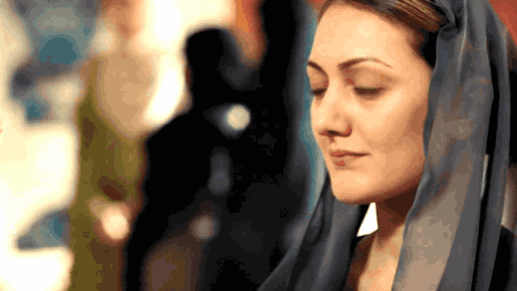
In the show Suleiman Seems to be older, followed by Sah or beyhan, Fatma being somewhat middle and Hatice as baby of the Family, while actually going backwards. One thing I want to make clear is that all the full sisters of sultan were older than them(before 1522 of course), half sister could have been either younger or older. So Fatma, Beyhan and Hatice despite being portrayed as younger sisters were definitely older. A more accurate sequence would be:
Hatice- c. 1490
Fatma: 1491-92
Beyhan: most likely 1493
Suleiman: 1494
Hafsa: 1495
Sah-huban: 1500
Suleiman also had at least three brothers orhan, salih, who seemed to be older than Suleiman, a sister who likely died during childhood and Shehzade sultan or Hanim sultan, who was either another sister or perhaps she never existed and all the little sources about her is actually about hatice.
3. Origin of Sah Huban Sultan.

She was not the daughter of Hafsa and older sister of Hatice, she was actually the youngest of shown siblings,born as the only child of an unknown concubine registered as " The mother of Sah Huban Sultan".
4. Origin of Hurrem

In the show she was portrayed to be Crimean and was addressed as " Russian slave" numerous times. However, she was actually from Ruthenia, it was then part of the Polish crown, now it's part of Ukraine, so definitely not Russian.
5. Forgotten Children
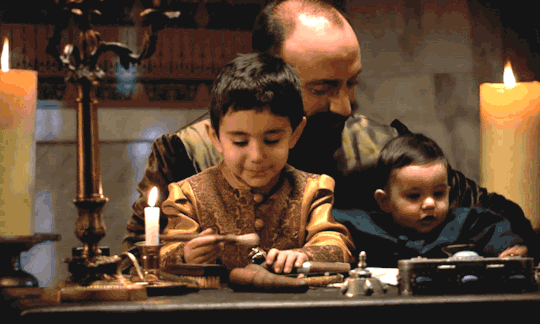
Apart from the six children that were shown in the show, Suleiman had four other children. Three sons and a daughter.
Shehzade Mahmud and Shehzade Murad were born before Hurrem arrived and had different mothers. Mahmud was the eldest born in 1512, Murad was younger than Mustafa born in 1519. Raziye was born between 1513 and 1518, but most likely she was born in 1513-14 as she seems to be the second child and old enough to be considered Mahidevran's(which is by the way false). All three of them died in 1521 as the result of the plague.
The fourth child Shehzade Abdullah was born as the fourth child of Hurrem and Suleiman, born in 1525 and died in 1528. His date of birth is kind of troubling, some historians argue if he was born in 1525,some even say he was Mihrimah's twin, but considering no birth of twins registered, definite ages of other kinds and his appearance in Hurrem's letters Abdullah seems to be born in 1525.
6. Nurbanu's Triplets

Mistakes about the birth of Selim I daughters are more or less clear, let's speak about Selim II as well.
In the show, triplets- Sah, Esmahan and Gevherhan were introduced as younger twin sisters of shehzade Murad. In reality, all three were older but certainly not twins, Sah was not even Nurbanu's daughter, she shared the birth year with Gevherhan though, both were born in c.1544, then was Esmahan in 1545, Murad in 1546, at this point Nurbanu stopped giving birth to any more kids, last of Selim II's kids was Fatma born in 1559.
7. Origin and death of Gulfem hatun
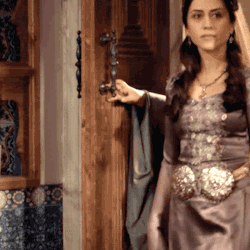
In "Magnificent century" Gulfem is portrayed as Suleiman's first concubine, who bore a son,but lost everything after he died. In reality, Gulfem was one of the highest ranking harem managers, whom Suleiman trusted Hurrem to, she was overseeing her education and well-being, bonding with future Haseki Sultan in the process. Gulfem actually became the closest friend and Confidant of Hurrem, about which I will speak about in part II.
Her death was also portrayed inaccurately. She was not killed for the attempted murder of Suleiman, The closest rumor to it is him executing Gulfem for rejecting him,but she actually died of old age. Suleiman had no reason to execute Gulfem,there is a version were Gulfem exchanges her Night to other concubine to for money to build complex,but there are so many flaws in this theory:
1. There was no such thing in harem as "my turn and your turn"
2. It was strictly against the traditions to call harem servant, especially one from the highest ranks, and considering when it happened in kate nineteen-early twentieth century at caused some probmens,which means tradition was never broken before
3. Gulfem had right to send concubine to Suleiman and even reject one already chosen.
4. Suleiman had no known concubine that time
5. Gulfem was not building anything as all of her projects was already finished.
6. Even if she was building something, it would cost so much mere concubine would never have enough money to help it. Gulfem's daily stipend was 150 akches, which is almost four times as much as Mahidevran's and almost as much as imperial princesses', while titles concubines were receiving 1-6 depending on their status.
7. Even if she needed something she would ask it to either Suleiman, Mihrimah or Sah huban as we know it had happened before and they thought her as family member.
8. Even if we just jump these 7 reasons and somehow accept that Suleiman realy called her that night , he would never kill her for that, she broke no rule, she needed money for project, he would understand this.
9. Gulfem was childhood friend of Suleiman, she was already a high ranking woman when mahidevran came,so she was certainly older than her,who was likely born in 1498-99, she was even older than Suleiman most likely. She was a childhood friend of one of Suleiman's sisters so her date of birth could vary from 1490 to 1493. That would make her between 69 and 72 in 1562. Dieing at such age is nothing strange even today, live past 60 was actually achievement in her era. There is no need to look for intrigue where there is none. Several theory existed,but show chose most dramatic one,that happened to be least likely.
8. Safiye's arrival

I have nothing against the portrayal of her origin, but about how she got in Murad's harem. Accord- ing to MC she was Mihrimah's gift. However,in real life she was raised and educated at Humaşah sultan's court,who later gifted Sifiye(then called Meleki) to her cousin.
9. History of Kösem

In Magnificent Century Kosem young Anastasia was kidnapped as a gift of Safiye to Ahmed per his accession. Actually, Kösem, then called Mahpeyker, was a servant of Handan Sultan and met Ahmed in his mother's personal Gardens. Ahmed developed a "Childhood crush" towards her and Handan,aware of what it could cause, had Kösem beaten up and exiled. When Ahmed ascended her recalled her and brought back.
10. Another forgotten child.

In the show, Şehzade Mehmed died without any kids, while in reality, he had a posthumous daughter born in 1543 named Humaşah. Who grew up to be one of the most powerful women in the Ottoman empire. She was one of two favourite grandchildren of Suleiman and Hurrem and due to the death of her father, she was raised in the household of her grandmother, so she would have been deeply involved in their later life. However, her existence was completely cut out, while the role and importance of Ayse Humaşah, daughter of Mihrimah Sultan was reduced into nothingness.
#history#16th century#historical drama#magnificent century#magnificent century kosem#mc: kosem#medieval women#hurrem sultan#kosem sultan#safiye sultan#nurbanu sultan#gulfem hatun#sultan suleyman#ottomanladies#ottoman history#ottoman#ottoman empire#ottoman sultanas#historical figures#historical events#haseki hurrem sultan#ayse sultan#valide sultan#historical fiction
178 notes
·
View notes
Note
Hello,sorry for bothering I saw the topic about the daughters of Sultan Ibrahim,I would like to ask your opinion about who was or were the daughter(s) of Turhan Sultan? Actually did she even have daughters? Hammer mentions that Turhan had tried to save the lives of her sons in laws Sari Kenan Pasa and Haseki Mehmed Pasa from the wrath of Koprulu Mehmed Pasa,but couldn't save their lives due to their participemce in the opposite faction and also because of his corruption deeds which were large too(about Haseki Mehmed Pasa). I read this in the Croatian translation of Hammer's History of Ottoman empire V6(page 458). Whoever were the identitites of(Atike or Gevherhan)of the princess who was wife of Sari Kenan Pasa,and the wife of Haseki Mehmed Pasa(Ayse or Beyhan)seems to be probably daughters of Hatice Turhan Sultan? Also J.Dumas mention in Les perles de nacre sultanate in page 83 Ayse is buried along either to her father Ibrahim or either along Mustafa I. There is also found notebook:Ayşe Sultan’ın Cihaz (Çeyiz) Defteri in name Ayse Sultan about items and jewelry for her dowry in 1682 found in the archives by researchers,who is identified as most likely sister of Mehmed IV. But maybe she was not his sister,but possibly his daughter? Also J.Dumas mention in Les perles de nacre sultanate page 496 mention that Atike(daughter of Ibrahim I) was married 4 times:firstly to Cafer Pasa,secondly to Sari Kenan Pasa,thirdly to Mostarli Ismail Pasa and forthly to Cerah Kasim Pasa. There is also article about Rabia Sultan(Haseki of Ahmed II)-Kuzguncuk Asiye Sultan ve Haseki Rabia Sultan Yalilari,which mentiones that Gevherhan Sultan(daughter of Ibrahim I),had left her lands and mansions to the haseki of Ahmed II-Rabia Sultan and his daughter Asiye Sultan. Ragusian sources also mention Kaya Sultan(daughter of Ibrahim I)as Safiye Sultan dated in 1662 as widow of Haydaragzade Mehmed Pasa in Per favore de la soltana in page 113. Hammer also claims that Kaya Sultan was sister of Suleiman II(according to the Croatian translation that they shared same mother this is it mentioned in page 431 accordring to Croatian translation). In your opinion did Atike(daughter of Ibrahim I) existed after all and if she didn't who was the sister said by contemporary sources to be own sister of Mehmed IV? Also in the Croatian translation(page 494)of Hammer' History of Ottoman empire V6,that Turhan Sultan had took under her care and raised the orphan son of some man named Ali. Do you know who was that man Ali excatly and how was he clouse to Mehmed IV? Once again sorry for bothering and for the many questions.
Hello and no problem, you’re not bothering!!
So, I can’t read your citations because I use the French version of Hammer’s work and I can’t find what you’re talking about because I think the books are divided differently. Volume 6 of the French version goes from 1547 to 1574.
Anyway, the issue here is: was Turhan Hatice protecting those men because they were the husband(s?) of her daughter(s?) or was she doing it as the valide sultan, the custodian of the dynasty, after receiving those princesses’ appeals? It’s the same issue we have with Ayşe Hafsa trying to stop Ferhad Pasha’s execution. Did she do it because Beyhan was one of her daughters or only as the valide sultan?
The thing is foreigners didn’t separate between sisters and half-sisters, so it is almost impossible to understand who the princesses’ mothers were.
I’ve already talked about Gevherhan binti Ibrahim and Atike binti Ibrahim here and as of now I have nothing to add. There is a clear problem with Ahmed I’s, Murad IV’s, and Ibrahim’s daughters because they all seem to have the same names and we don’t have precise dates of their births and deaths. The fact that these sultans lost many children is another issue, as their mausoleums are overcrowded and it is difficult to identify all the caskets.
As for Dumas’ family tree, I think she followed Alderson and therefore accepted his sources (mainly von Hammer). If you read the ask I linked above, you’ll see there is a lot of confusion with Gevherhan’s husbands because they seem to parallel Atike’s, but Atike binti Ibrahim was never mentioned by Ragusian diplomats, who called that princess Gevherhan instead.
Let’s move onto “Bir Sultanın Mücevherleri. Ayşe Sultan’ın Cihaz (Çeyiz) Defteri”, an essay by Gülser Yardım.
So, the author says that the Ayşe Sultan in question is most likely a sister of Mehmed IV because Turkish sources never mentioned a daughter of Mehmed IV called Ayşe. On this blog, though, we know that a Ayşe Sultan binti Mehmed IV really existed because the Venetian ambassador Giacomo Querini reported in 1676 that Mehmed IV’s favourite Gülbeyaz gave birth to a princess in Babadağ two years earlier:
“Ora tiene due figliuoli maschi e due femmine. […] La figliuola Aidè si ritrova in età di sette anni e resta collocata in matrimonio a Culoglù Musaip, favorito […] L'altra piccola figliuola si chiama Attigiè, cioè Sparaviere, nata ultimamente a Babà Daghi [Babadağ, Romanian city] dalla Tulbeias [Gülbeyaz], cioè Rosa Bianca, e tuttochè si trovi in età di due anni, resta promessa in matrimonio a Carà Mustafà Caimacan in età avanzata di 60 anni.”
He confused the two princesses: Hatice is the older one who will marry Musahib Mustafa Pasha, while Ayşe is the younger one, born from Gülbeyaz. Moreover, Hammer clearly states that the daughter of “the little Haseki” (Gülbeyaz) is betrothed to Kara Mustafa Pasha:
la fille de la petite Khasseki destinée en mariage au kaïmakam Kara Moustafa (Histoire, vol. 11, p. 419)
According to Uluçay, “the little princess” was married to Kara Mustafa Pasha during Hatice’s wedding to Musahib Mustafa Pasha. Hammer doesn’t mention this but says that Musahib Mustafa Pasha had gifts for the sultan, the Valide Sultan, the eldest prince, the Haseki, his fiancée (Hatice), and the daughter of the “little Haseki”. During the festivities, though, Kara Mustafa Pasha received sable fur for being the second son-in-law of the sultan. I think this was some kind of betrothal, not a wedding.
Anyway, back to Ayşe. It is interesting that Bir Sultanın Mücevherleri. Ayşe Sultan’ın Cihaz (Çeyiz) Defteri says that most of the jewels Ayşe received were then given to other women:
A diamond crest was given to Ümmi Sultan in 1698-99
A set of diamonds was given to Emetullah Kadın (Ahmed III’s consort) in 1703-04
A garnets bracelet was given to Afife Kadın in 1693-94
A diamonds bracelet was given to Alicenab Kadın in 1697-98
and so on.
Now, I think that Ayşe Sultan died very young if one of the bracelets in her dowry was given to Afife Kadın as early as 1693. Also, Kara Mustafa Pasha was executed in 1683 so the dowry prepared in June 1682 wasn’t needed anymore anyway.
About Kuzguncuk Asiye Sultan ve Haseki Rabia Sultan Yalilari. It was common for sultans to bestow mansions and other properties to their favourites and daughters. If I remember correctly, Murad IV had bestowed a garden to Kaya Ismihan even though she was a child. That Asiye Sultan received a mansion even though she was a baby was quite normal. Gevherhan had died in 1694 so her properties were bestowed to Rabia and her baby daughter Asiye.
Gülnüş had received properties belonging to Fatma Sultan binti Ahmed I after the princess’ death.
Let’s move onto Kaya Sultan binti Ibrahim.
Hammer says that Kaya married Haydarağazade Mehmed Pasha:
Vers cette époque eurent lieu les noces de la fille du dernier Sultan Ibrahim, Kia Sultane, avec Haïdaragazadé Mohammed (Histoire, vol. 10, p. 241)
Sicill-i Osmani, though, doesn’t indicate Haydar Ağazade Mehmed Pasha as a damad, nor is Kaya Sultan listed.
I couldn’t find anything about her mother. Unfortunately I couldn’t find your citation in Hammer.
I honestly have no idea who Mehmed IV’s own sister was… I truly have no opinion about this.
#ask: ottoman history#ayse sultan daughter of mehmed iv#kaya sultan daughter of ibrahim i#asiye sultan daughter of ahmed ii
12 notes
·
View notes
Note
How would Sultan Süleyman mother and sister feel for Concubine reader and their children?? Would they also become yandere for them or no?

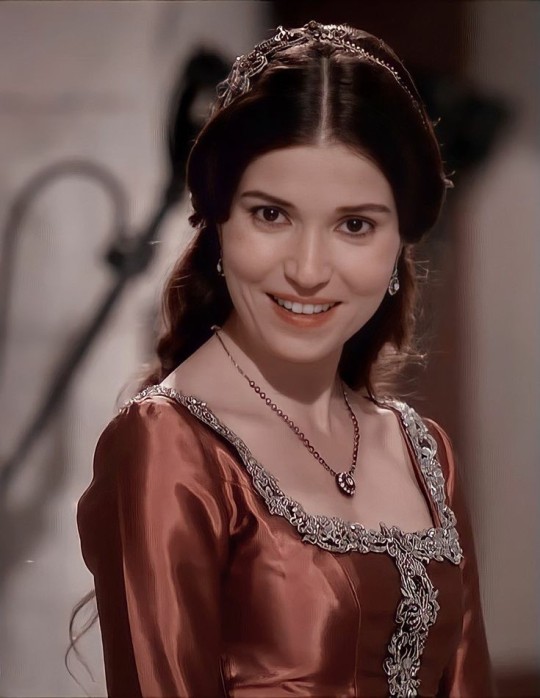

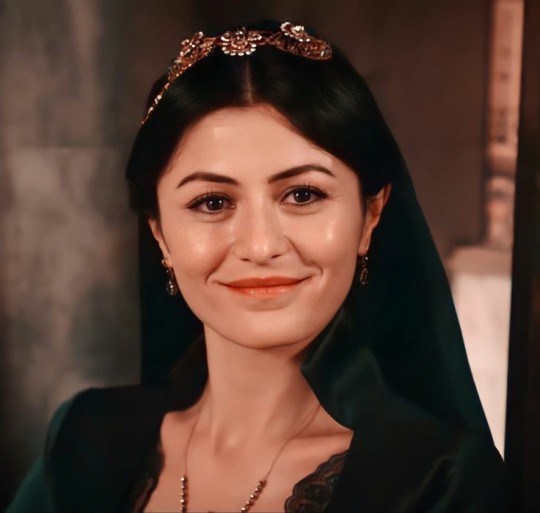
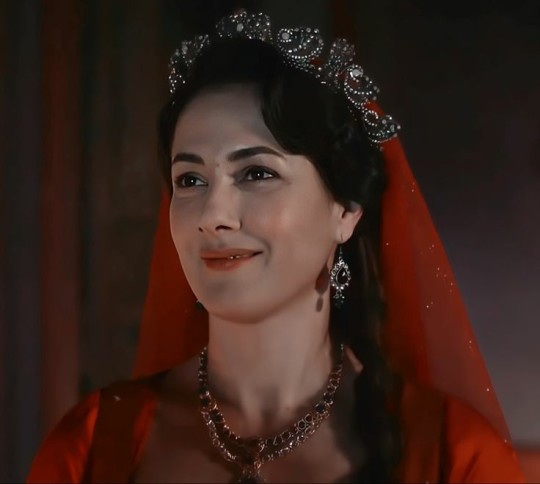
Nice question. Hafsa Sultan keeps her distance at first. However, he soon develops yandere tendencies for Concubine and her grandchildren. Hafsa Sultan does a great job at hiding her tendencies. Everyone thinks that Hafsa Sultan loves and protects Mahidevran and Mustafa. Actually, they are very wrong. Hafsa Sultan loves and pampers the Concubine and her grandchildren. He is protective of them. No one can disrespect or harm the Concubine and her grandchildren. He likes to chat with the Concubine and spend time with her grandchildren.
Hatice Sultan develops the first yandere inclination towards the concubine and her nephews. His other sisters also join him in this trend. At the latest, the tendencies of Shahuban Sultan will be revealed. However, all of them are protective against the Concubine and her nephews. The daughters of Hafsa Sultan do not stop pampering and supporting them. All will strive for their well-being.
#yandere magnificent century#magnificent century#yandere suleiman the magnificent#muhteşem yüzyıl#yandere ottoman empire#ottoman history#ottoman empire#yandere ayşe hafsa sultan#yandere hatice sultan#yandere beyhan sultan#yandere şah sultan#yandere fatma sultan#yandere character#yandere historical characters
112 notes
·
View notes
Note
i noticed that in the manga hurrem is already referred to by the "haseki" title preceding the death of suleiman's mother, when to my knowledge he only legally married and created the title "haseki sultan" for hurrem after hafsa died, to solidify her position of authority in the harem. but manga hurrem also doesn't seem to be referred to by the title "sultan" yet, only "haseki." is it a case of historical liberty on the manga's part? and do you think manga hurrem will receive the "sultan" rank separately after being legally married to suleiman, or is she already considered someone with the rank of "sultan" since she's been given the haseki title? sorry about all the questions and tysm for the translations!
Sorry for the late reply, but I had to take a couple of books from my shelves for this XD But shortly after I figured it will take me too much time to do a deep research, so here's my unimportant opinion as an Ottoman history familiar:
When a woman is referred to as "sultan" in the Ottoman Empire, it doesn't mean that she is a "sultan." What I mean is, the Ottoman Empire does not have the "king/queen" or "emperor/empress" duos. You only have the male "sultan" as a ruler. Females being called "sultan" was mostly out of courtesy, and didn't mean that they had an official title in the state protocol.
I believe Hafsa was the first woman to be called "Valide Sultan", using the word "sultan". Also, the sultan's daughters/sisters are also referred as "sultan." For instance, we call Hatice "Hatice Sultan", but I call her simply "Princess Hatice" in the translations to avoid confusing the readers.
As for "haseki"s, they were simply sultan's favorite consort who gave him a son, and sultans had several haseki afterwards. Only the #1 haseki was called "haseki sultan." And again, That didn't make them a "sultan" like the emperor. At best, it meant that she is a woman to be respected because she is important to the sultan himself, like his female kin.
And there is also the mess created by the Europeans, who didn't understand how the Harem worked, and thought that just like their kings have queens, the Ottoman sultan must have a "sultana."
And later on, the use of the title "sultan" fell out of fashion with sultans's wives. So, we can say that even the people concerned didn't attach much meaning to it. And seriously, unless you are the valide sultan, being a "sultan" didn't make you the "sultan of the harem" anyway.
Okay, sorry but I don't even know what I'm getting at and made you read all this rambling XD
4 notes
·
View notes
Text

~VALIDE AYŞE HAFSA SULTAN~
She was the favorite consort of Sultan Selim I. Following the one concubine mother -one son policy she gave birth to three daughters Hatice, Fatma, Beyhan and a son Süleyman (Süleyman the magnificent). She was very loved by people, her master, her childern and the whole harem. To express his love to his mother, Sultan Süleyman gave her the Valide Sultan title, before that, Valides were addresses as Valide hatun. Thus, she became the first slave origin woman having the title "Sultan". Her exact date of birth and origin are unknown,she bay be from black sea regiok but she was definitly NOT the crimean princess, daughter of Mengli Giray. Hafsa Sultan was the first slave origin consort able to build a imperial mosque (Sultan Mosque in Manisa). She died on 19th March 1534 in Istanbul. She rests in Yavuz Sultan Selim's Mosque.
youtube
#youtube#hafsa sultan#ayse hafsa sultan#ottoman empire#sultan suleyman#valide sultan#history#ottoman#Youtube#Spotify
15 notes
·
View notes
Photo










Like mother, like daughter (requested by anonymous)
#Muhteşem Yüzyıl#Magnificent Century#mcedit#Hurrem Sultan#Hürrem Sultan#Muhtesem Yuzyil#mc#wspaniałe stulecie#Mihrimah Sultan#Hatice Sultan#Huricihan Sultan#Sah Sultan#Esmahan Sultan#Şah Sultan#Hafsa Sultan#requests#Awkward-Sultana#Fatma Sultan#this is when I wish we got to see Raziye#Mahidevran's daughter#weloveperioddrama#perioddramaedit#period drama#perioddrama
120 notes
·
View notes
Note
I always found it interesting how Hatice claimed that they "don't need nobility but to light a fire in the Sultan's heart" when she and Gülfem were looking for concubines in E64. It may seem like nothing special initially, because obviously she would know what could win the battle with Hürrem would be something that can match and exceed her, but then I also see it as a nice touch of her not prioritizing the dynasty one hundred percent. And I feel it could be a different kind of not prioritizing the dynasty when it comes to Hatice. Usually, when she doesn't prioritize the dynasty, it's because the dynasty opposes something she values dearly (which is often connected to family; we know how important the line between dynasty and family is for Hatice's character). But here? She doesn't prioritize the dynasty for the sake of a personal goal, even if this goal is to put the one who's disrupting the balance and peace in Hatice's eyes in her place. (I'm probably reading too much into it, but still.... also, Hatice's the best in all seasons and I'll always stand by that, but this bears saying.... #stanS03Hatice. All the way.)
Which brings me to the way each sister of SS has a different fascinating relationship with the dynasty. They all have the common dynasty values in some capacity, but how much they're willing to cross them and what for, differs for each of them. I wish this was more appreciated with them and they weren't reduced to "elitist biches" where it's as if that's what they're all about, as if they're elitist in the exact same way and always use the same approaches, which.. couldn't be further from the truth.
Thank you sm for this ask Plami, it's a very interesting take and I think I get what you mean! Hatice wasn't very strict with dynastic interests in this aspect, which contrasts her mother's relationship with harem's rules, I feel this particular difference between both has a lot to do with how Hatice is the dynasty sultana who has the deepest relationships with slaves in all the franchise, which ofc adds to how she values their qualities & feelings besides their origin, how much they can impact her as well, to me this comes from how she grew up in Manisa in Suleyman's harem and developed her principal relationships there (friendship with Gulfem & Mahi, and maybe also a bit of admiration for Ibrahim), while her mom apparently grew in her royal family's palace, probably without such familiar contact with slaves, which is showed a lot on how insensitive she is with them, keeping always many distance even with those she supports, like Mahi, or those she trusts, like Daye. Hatice developing certain sense of "admiration" for slaves was maybe foreshadowed in the first episode, when Hafsa is focused on punishing Hurrem's rebellious behaviour while Hatice highlights her beauty, something pretty shallow to do, ofc, when an enslaved woman is asking for help- but still something different to what her mom would expect of her. Maybe Hatice was thinking Hurrem could be a good concubine for her beauty, similarly to how she doesn't care for positions in looking for someone to replace her later, because she knows herself that the person's origin doesn't matter when "lighting a fire in the heart" and again, this relates to her previous mentioned friendships & to the fact she ended pursuing a forgiven love with an slave, who conquered her with his melancholic music and passionate poetry, so really she knows from experience what it is to have her heart lighted.
Hatice's sisters aren't in the Manisa flashbacks plus we don't know their exact ages, to my thinking Sah is eldest than Fatma and Hatice (and maybe Beyhan?), so that's why I head-cannon she's the one who has absorbed more her mom's values, maybe similarly to Hurrem & Mihrih, Hafsa gave a task of protection to her daughter since she was a kid, in this case protection of the dynasty & its rules, perhaps this is why Sah has such an internalized view of her family's superiority, a similar distance from slaves than Hafsa's & she's the most elitist sister, this combined with Hatice being more over protected for her sensitive nature & the deaths she suffered since her young years, could explain how Sah's the one that replicates her mom the most and develops this strong responsability for the following of the rules & respect for her family's pride, which, as we see, she'd never left an slave risk.
Sah feels that prioritizing her dynastical family is the natural thing to do, while Hatice's problems with slaves (especially Hurrem but also her event with Mahi for the Valide's chambers and the marriage crisis with Ibrahim) always have an emotional cause, this takes the worse of her & not only shows her own internalized sense of superiority in that she has the dynasty's interests (aka her own peace & happiness, but also sometimes the order in the harem) as a priority, but also how much she allows herself to be emotionally open to slaves, she allows them to hurt her, in this way when she's screaming at them about rules and positions, she's still perceiving them in a very different way than Sah or Hafsa ever could, because she's showing her vulnerability to their words and actions, she's letting them see how much they can personally hurt her & at the same time, that she trusted them enough to expect better, Hatice doesn't take the same distance that she's supposed to for her position, she bonds with them & even if many times she can't comprehend their struggles, she's there to hear them and comfort them, that gives more complexity to her relationship to the dynasty, her fight is about those she cares for & those she feels betrayed by, while Sah's conflict is simply on not letting Hurrem win to a dynasty member & get such big position as a former slave, because Sah would never let someone like Hurrem, from slave origin, have enough proximity to her to personally hurt her, it's about her family & their dignity, and that's why I totally get you when you say Sah's most interesting relationship is that to her sister, because she would never end opening up so much to anyone else, she can care for certain servants as Mercan or Gulfem, but their relationships end being more about servitude than friendship, while she expects more of those of her same position, for which Mihrimah going against her shocks her but also makes her leave, this isn't her fight when there's no "threat to the dynasty" to destroy, in this sense while Sah can be colder & cruelest to reach her goals, she also has her limits, she's not fighting for the sake of fighting, something that her sister, after Ibrahim's death, seems to be doing in order to keep on living.
Sah's promise gave Hatice something to live for, but this revenge goal couldn't keep her alive for too long, not after her life was taken from her & her brother Suleyman was the one who did it, here there's another big difference: Sah seems to think this ends with Hurrem's death, yet Hatice isn't prepared to keep on living with the one that betrayed her so horribly, the one that took her happiness, not only her family life with Ibrahim but also her relationship with her brother whom she trusted and loved, and this one isn't Hurrem: is Suleyman himself, that's why her revenge includes him without Sah's knowledge, because she knows how much It'll hurt him to lose his loved one, because the biggest betrayal Hatice feels actually comes from another dynasty member, the most powerful one, someone that Sah would never directly cross - but those limits don't touch Hatice, just as she has left slaves touch her heart without caring for their positions, she's been perceiving the Sultan besides his position, she expects from him what she'd expect of any brother she trusted in, Hatice has such deep relationships with everyone that maybe that's why her anger cuts the most, because she explodes & not in the predictable way the dynasty representatives (TM) usually do, she leaves herself be vulnerable and dependant of those relationships, so when she's hurt she'll also use her position to shut them, despite not knowing how humillating and horrible this is to the slaves, that similarly find her to be someone they can count on & with whom they can express more freely, so ofc going for that and finding yet another elitist reminding it's very big -yet Hatice doesn't have so many situations with this happening, and her elitism ceases to be impulsivily used on those she loves to be more a tool in her fight in S3, and damn what a season for her! It's everything that's been built from the start taking shape in a situation in which she senses her ideal life is being destroyed, in which she sees the threat to what she has and picks a side, and finally gets obligated to live in the exact opposite of her ideal life, she loses her sanity but also gains more awareness than ever and her character reachs the peak of my fascination.
Now, talking of Hatice & Sah alone we can already get a taste of the oversimplification that the "team dynasty" implies, because those two may fight against Hurrem, but their reasons & goals are SO different that defining them both for their common enemy takes all their complexity away from them. I'm not sure where the "Team Hurrem VS Team Dynasty" started, I have seen it in an old MC tumblr tag as well as in youtube pools by the official channel... But it always sounded pretty ridiculous to me, because both "teams" suffer from this oversimplification in which when you analyze all the characters that could be realistically included you see Team Hurrem may as well be called Team Dynasty lol, because the "Team Dynasty" apparently not only includes those who strictly have the goal to defend the dynasty -Hafsa & Sah- or those who belong to the dynasty and happen to oppose Hurrem -Hatice, Mustafa & Fatma-, but it's everyone !! that opposes her, which means Mahi & Ibrahim being included in something that doesn't represent them at all just because, as always, every damn character needs to be defined by their relationship to Hurrem, we both know how this works, oldest take ever, Nigar's & Hatice's characters apparently got shitty because "the writters changed their friendships with Hurrem!!", Mahidevran is the "bitchy villain who always cries because she hurted Hurrem and also she doesn't deserve Hafsa's & Ibrahim's support, that apparently comes from nothing because ofc, the only part of these people's stories that counts is the one where Hurrem gets involucrated, and their relationship to her will define their whole characters", and I can go all the post citing examples of this simplistic logic applied by a majority of the fandom, that then jumps to "this is bad writting" when they gotta recognize something shitty Hurrem did, because characters can't be complex and be defined by both the good & evil they did, and the writters can't potray different characters having their own reasons & struggles too, if they do it it's obvious favouritism for the "Team Dynasty", aka the trash bag where you can throw anyone that doesn't like Hurrem, that gets the elitist oppresive tittle & oversimplification, while the other team is literally just Hurrem, obviously there wasn't the most powerful dynasty man supporting her & being her source of power, together with the fact of giving him 5 dynasty members, and there was no shitty man that no one likes as her political ally, because "Team Dynasty" has to mean you support people with totally different views and goals as Hafsa & Mustafa, but let's not even dare to imply everyone that stans Hurrem also stans her pedofile son-in-law Rustem, sharing a goal doesn't make them the same type of people...
Ugh, here I am again rolling my eyes to the double standars, but what I basically want to say, objectively speaking, is: it's impossible to throw such complex characters in "teams" when they are characterized for having different relationships to the dynasty, the slavery, their views, their opportunism, etc - we can see alliances like that of Hatice, Sah, Mahidevran & Mustafa, Hurrem, Mihrimah & Rustem, Nurbanu, Selim & Sokollu, etc, but then every piece still has its individual objective & story that drives them in, Hatice & Sah would never be agreed about crossing Suleyman, Hurrem & Rustem would never be agreed about picking between Selim and Bayezid and Nurbanu & Selim have many moments in which their views differ and Nurbanu has to act on her own, and we see especially in S4 how the alliances don't necessarily oppose each other, and how there's characters -Rustem, Atmaca, Fatma, that traitor Lala- that upon the change of the general situation switch sides for different motives, be it opportunism or death of their desired heir, and make everything even more complex to simplify.
MC is fascinating, it's full of mistakes but lack of individualism it's most of the times not one of them, there's re-used plots with similar types of characters but I'm completly agreed, it's never about simply "elitist bitches" vs "rebellious manipulative slaves", there's so much more to it, so many different beliefs and experiences that leads the characters to do what they're doing, so much that even despising them you can see where it comes from. It's a lot of fun to analyze it too! and that's why it can be sad to encapsulate everything on shallow teams & positions that don't fully represent the characters' psychology & situation.
I'm leaving this here, thank you for reading 😘, hope I could answer the ask succesfully because I kinda changed topics when the "elitist bitches" simplification reminded me to the shallow divition of teams, also hope I didn't make many grammatical mistakes and the points can be well understood, anyways whatever you want to add it's ofc welcomed, as well as anyone's opinion on the subject.
38 notes
·
View notes
Note
Opinion on
Sah sultan? Her influence and power? how powerful do u think she was and if she stayed could she have defeated mihrimah? or hurrem?
I really loved Şah’s character. And I think her character gets frequently reduced in the fandom to being “badass” princess & her power fight with mostly Hürrem (also a bit of Mihrimah).
Yes, she’s the most ambitious and pragmatic of Suleiman’s sisters. I’d also say she had the most influence on Suleiman of them all, perhaps because she reminded him of their mother most and she never actually crossed him, which is why she absolutely could contest Mihrimah’s claims and continue the fight. However, she chose not to. I also elaborated on this issue earlier here.
All of Suleiman’s sisters try to replace their mother following Hafsa’s demise, as an upholder of harem order & protecting the dynasty. Hatice even invites Şah specifically so she can support her in this task, even despite the fact they weren’t the closest of sisters, such as she was with more maternal-like Beyhan. Still, of course Şah does not take a stand against Hürrem just because Hatice wants her to - first and foremost, those people do not live in vacuum and it’s implied Şah and Hürrem actually have met before. For several episodes Şah observes and assesses the situation carefully without taking any side openly and Ibrahim’s death is the moment she decides to act, even though her plans are still hidden because she has a long-term plan. Her method of working to remove Hürrem is very wise - she decides not to try to assassinate her, bring another woman or anything of this sort, but to make her fall permanently from Suleiman’s favour. And she also knows what is the only thing to make Suleiman cast Hürrem away - not her doing any harm to others or committing any crimes, but to hurt his ego and use his paranoia. If Hürrem had yielded and had crowned Bayezid (and Şah again did it so masterfully it was very believable Suleiman d worded), it would have been over. It’s the sort of thing Suleiman would never forgive Hürrem, probably the only one. Same with making H loans money from Venetians during war with them. /Big thanks to @mc-critical for our discussion on this topic some time ago :)/
Sah and Hatice’s relationship is very complicated - they are like polar opposites, with one being highly emotional, and the other very pragmatic and cold, but despite even Hürrem hoping for wedge between them and trying to put it between them - she cannot. Sah is very much concerned each time anything happens to Hatice and she is heartbroken seeing her pain following Ibrahim’s demise too. She promises Hatice she will help her in revenge “Because anyone who comes to their palace with blood and death, will leave with the same”. Their family got attacked and obviously subsequent actions of Hürrem against Mustafa only solidified their need to unite against her.
Sah also has her own ambitions, which I mentioned in the other post, but those are not only simply power oriented. She also desires to prove herself to her own family by being the one to neutralise Hürrem, which is why she has the arrogant attitude towards Hatice or Mahidevran. Unlike Fatma or Hatice, she actually abandoned hope for a fulfilling private life - she’s stuck in a marriage to a guy she does not respect, but she also knows she needs him for pragmatic reasons. The guy she clearly admired a lot married her sister, and even Suleiman & Hafsa showed their preference for sweet Hatice. She felt like her colder, more pragmatic personality was not appreciated enough by her closest. This is why she mocks others’ attempts to remove Hürrem and tries to paint herself as different. In a way it actually shows her inferiority complex & also desire to prove herself to others.
While Şah is deeply embittered by her marriage and does not actively search for love (like Hatice or Fatma), she has a close bond with her daughter (for whom she also sets aside her pride and asks Suleiman to spare Lütfi) & also is very concerned with spiritual matters. Of course providing money for religious establishments & building endeavours (which was done also by historical Sah) is also a way to gain influence, it’s clearly an area important to her also personally, which is why in the end she decides to live in one monasteries after her marriage falls apart and Hatice dies.
And it is a great ending to her arc IMO. She’s well aware that to have an influence as a princess, she should get married again to a prominent statesman, but she obviously does not desire another marriage after the last one ended so traumatically. Hatice took her own revenge herself before dying & it seemed that she was the one who neutralised Hürrem in her last desperate attempt. Suleiman is depressed and while she leaves Mercan to take care of him, idk whether she’s up to sitting with him and pretending she’s sorry Hürrem disappeared. Since Hürrem is gone, Rüstem is powerless and it seems like Mustafa does not need protection anymore.
Standing against Mihrimah would be for Sah a betrayal of her values - standing up against her own blood and dynasty, for what at this moment? Staying in the capital, where almost all her closest are gone? Power for the sake of empty power now?
Sah did never want any harm to come to Hürrem’s kids yet she already almost brought harm to her family inadvertently - she specifically instructed Nigar not to harm Mihrimah or her daughter, only Rüstem and Hürrem, yet the little one suffered most. It was against what Sah wanted or believed in. She fucked up big time here and she knows it. She almost brought harm to dynasty she aimed to protect. It’s not the age when Dilruba sets her nephews on fire - Hafsa’s daughters were brought with a strong sense of family and family loyalty, which is why as much as they did not like Hürrem, they did not treat her kids as enemies, but as their own blood.
Şah is a woman of action and she has no more work to do in the capital. She was always interested in supporting scholars & monasteries, so she chooses to be important & influential there. She’s disillusioned by all the power games in Topkapi & the futility of it. She again confides in Mercan she’s tired. Sah does have her limits, she does not intend to cause upheaval by going against the dynasty (represented by fellow member in Mihrimah) & now all she needs is finding peace & calm.
Could she rival Mihrimah? Mihrimah at that point was not at peak of her power - she was still a young girl and freshly married to Rüstem who had not yet become the Grand Vizier and with Hürrem gone lost a lot of his power. Mihrimah’s role has much more increased following her mother’s demise when she was left with the task to protect her brothers and to be her dad’s adviser and confidant. Upon Rüstem’s demise (historically), she inherited his huge fortune, which helped her to maintain influential even though she was no longer married to a prominent statesman. Even though her relations with Selim were soured by her support for Bayezid, her brother needed her (or her money) very much once he ascended the throne. It’s truly when she was at the peak of her power - in early years of Selim’s reign, and again absence of Valide and Nurbanu needing time to build her own faction & network of power in capital also worked in her favour.
Princesses did not wield that much direct political influence usually, but Şah and Mihrimah were similar in that they found ways to yield some even without their statesman husbands they could influence. A bit of historical info to finish my musings:
Shah’s career as a sufi devotee began early, in Ioannina in western Greece, where she accompanied her husband Lutfi to his post as governor. There the princess became a lifelong follower of the popular sufi order of the Halvetis. Returning to Istanbul when Lutfi was promoted to vizier, Shah built the first of three mosques with an attached dervish lodge, this one for her Ioannina shaykh. The next lodge-mosque was dedicated in 1537 to the Halveti shaykh Merkez Efendi, who had recently become Shah’s new spiritual guide; the last was a memorial foundation erected after his death in 1552.
Source: Leslie Peirce, Empress of the East. How a European Slave Girl Became the Empress of the Ottoman Empire

Source: Necdet Sakaoğlu, Famous Ottoman Women
As we can see, Sah continued her construction & spiritual works following her divorce and moving out to live in a dervish lodge outside capital.
A bit about Mihrimah after Rüstem died (she was also aware how beneficial marrying a prominent statesman was because her proposal to Semiz Pasha was true also historically):
From this date on, Mihrimah lived as a widow until her death. In the beginning, Mihrimah was afraid that the political influence she had during her late husband's vizierate period would decrease after her husband's death. Indeed, according to the report of the Venetian bailor Daniele Barbarigo, she had proposed to Semiz Ali Pasha, who was the grand vizier after Rüstem Pasha's death, to marry him, but the Pasha refused the offer, saying that he was not thinking of marrying her. But Mihrimah continued to be politically influential as a widowed member of the dynasty.
Source: Zahit Atçıl, Ottoman Dynastic Marriage Politics and Mihrimah Sultan’s Marriage (translation mine)
And
However, Mihrümah, although now a widow after Rüstem’s death in 1561, still figured prominently in dynastic politics. To illustrate, she was privy to the fact that the royal treasury had been emptied by her father and carried to Hungary to wage the campaign, and she rushed to her brother’s aid, lending him the much-needed gold to cover the obligatory accession donatives. As such, Donini’s assessment and prediction concerning both Selim and Mihrümah’s future relations came true. The eventual return of Süleyman’s treasure to Istanbul, coupled with the pillaging of Chios under the command of Piyale Pasha, soon restored the solvency of the imperial treasury; but Selim remained forever grateful to Mihrümah for the aid she provided at a most critical time.
Source: Pinar Kayaalp, The Empress Nurbanu and Ottoman Politics in the Sixteenth Century: Building the Atik Valide
#sorry for taking too long#only now will try to catch up#on asks#sah sultan#mihrimah sultan#magnificent century#muhteşem yüzyıl#ottoman history#history#Joanna answers
55 notes
·
View notes
Text
It's interesting how when Beyhan confronting Ferhat Pasha's already inevitable execution was only a matter of time, Hafsa didn't shield Hatice from the issue. There could be a few reasons for this:
Hafsa's own stance could play a major part. She was in torment for Beyhan and how would Ferhat's death impact her most of all and yet she knew that it had to be done: the complaints against the pasha are legitimate and she could no longer save him. Throughout the entire situation, she was stuck between a rock and a hard place; the mother condoling with the pain of her daughter and the valide who has to support the sultan's decision and find the best way to deal with what would come next, were in conflict with one another. It may have gotten a little much for her for a second, in spite of how well she held her composure. So perhaps she would tell Hatice in seek for support through this hard time for everyone involved. To get another someone on board before the unavoidable occurred.
Again, Hafsa was aware how dire would everything be from that moment forward. It's not something that can be changed or washed off, it'd have horrible and permanent consequences. So I see Hafsa wanting to warn Hatice about the disasters that would occur, for her to be able to hold it together and be there for Beyhan when the time comes.
Valide seemed to have already prepared a set course of action (nope, I don't think she came up with this during the ultimate confrontation, given she was all deep in thought before the execution was announced to her) regarding Beyhan and how would she keep on: she would heal in the castle, next to both her mother and sister supporting her. Hafsa saw how close Hatice and Beyhan were and a part of her could've thought that namely Hatice could understand her pain and help with it even more. And it just dawned on me, but maybe... there actually was a slim chance for that to be true, even for a second. Because given what we know of her past and how it impacted her, I feel Hatice didn't tell Beyhan that she understood her pain just to console her. She truly has experienced something sorta similar pre-series: the death of her former husband. If there was someone in the room who could relate to at least a shred of Beyhan's sorrow, that would be Hatice. But of course, both experiences are still quite different and Beyhan justifiably doesn't feel like she's understood: "You can't [understand my pain], Hatice. One day, if my brother beheads your husband, then you will understand my pain."
18 notes
·
View notes
Note
Opinion on Ayse Valide Hafsa sultan and her relationship with mahidevran and Hurrem, was she jealous? What do you think of her as a mother?
Valide Hafsa sultan starts off as this noble aristocrat queen, she isn’t like any of the harem girls she came as a crimean princess who married the sultan and now a Valide sultan.
As a mother I personally think she is great. She doesn’t use her children to hurt anyone and she is very loving. SS considered her as his conscience and had so much respect to her. She cares so much for her daughters even if it meant defending a traitor because she doesn’t wanna see her daughters dismay. She fell ill at the thought of what Hatice pain will be after Ibrahim is exposed. She is overall a very good mother with some flaws like anyone.
I feel like she was jealous of Hurrem at some point. Her hatred to Hurrem basically came from that Hurrem didn’t follow their exact traditions but the reason I see the most is jealously. Hafsa was Selim I wife but we all know that Selim had consorts and wasn’t monogamous which obviously made Hafsa jealous. So to see Hurrem, a slave, having SS for herself while she , the crimean princess, had to share her husbands with other women was annoying to her. That’s why she is so hurt at SS marrying Hurrem because as an aristocratic person seeing a slave rising that much while she the nobility had to endure annoys her plus Hurrem’s position is new and confusing. She kept saying Hurrem might as well rule the harem so it is not that her ego isn’t satisfied but also her position is threatened. She is like “I endured then she has to”.
The whole “Hurrem is a threat” is fucked up imo. Valide and SS sisters were just justifying their behavior by saying that. When it comes to threats….Ibrahim is the biggest threat cause he could have Mustafa rebelling against SS , Ibrahim had the political influence that could actually hurt SS with his arrogance. Hurrem on the other hand can’t. If SS dies Hurrem and her children are done but for Ibrahim that won’t be the end as Mustafa will take the throne. Valide knows that very well , knows that if Hurrem is bad then Ibrahim is worse…she told SS on Mustafa’s engagement that Ibrahim and Hurrem are arrogant because of him. When SS got sick and Valide saw how much Hurrem genuinely cared for SS she opened up to her. Yeah there is a possibility Hurrem was more scared for herself and her children but at the end she realized Hurrem is not a big threat after all.
Her relationship with Mahidevran is something. Valide sultan sympathizes with Mahi and understands her cause she was once in her place. Valide is very engulfed by the harem system that’s why she wants to keep it going and Mahi following that is pleasant in her eyes. Mahidevran was not a threat to her cause she knows Mahi knows her limits. When SS was on her deathbed she is shocked not because Mahi is not crying day and night for SS but because the obedient little Mahi is now a threat?
Being originally a crimean princess she obviously knew the toxic system before coming to topkapi. For her this system is ideal even if that made her suffer in her youth. She applies what was applied to her because that’s the only righteous in her mind.
All of them at the end , end up like Hafsa. Hurrem ,despite being the biggest rule breaker, still believes that Nurbanu should follow the system and forget her Cecilia self. Mahidevran too she doesn’t feel bad for Aybige even tho she herself was still coping with SS neglecting her. It is an un-ending cycle of them becoming the toxicity they despised.
13 notes
·
View notes
Text

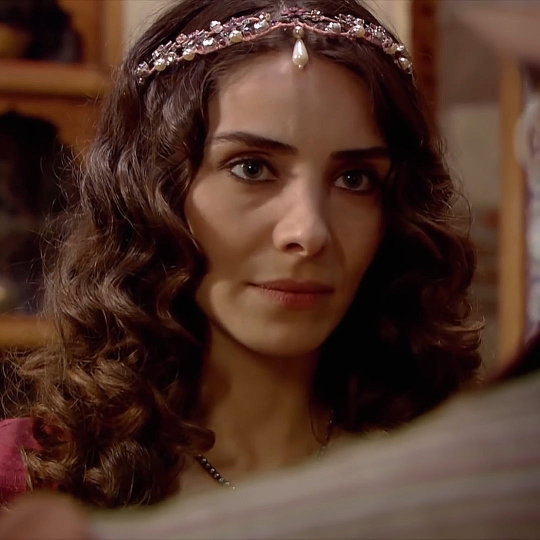




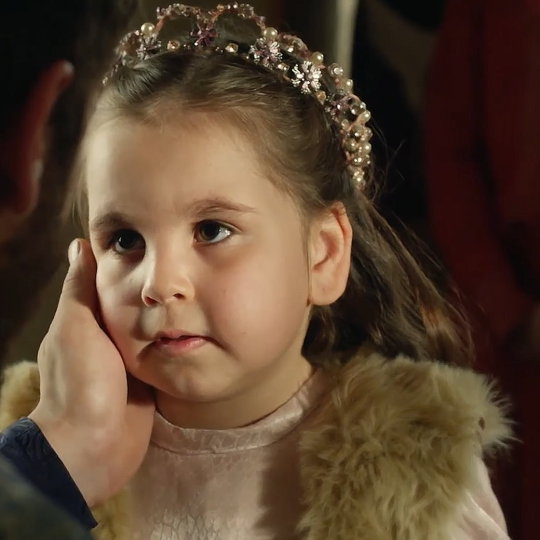
This pink tiara with a pearl drop was first worn by Hatice Sultan in the fourth episode of the first season of Magnificent Century. It was worn again by Mahidevran Sultan in the nineteenth episode of the same season. Gülfem Hatun can also be seen with it in the tenth episode of the second season. The tiara appears again on Mihrimah Sultan in tenth episode of the third season. During the use on her, the pearl drop eventually gets removed. The fourth season saw the tiara three times, first on Nurbanu Sultan in the tenth episode, then on Nergisşah Sultan in the eighteenth episode and lastly on Ayşe Sultan in the twenty-ninth episode.
#Muhteşem Yüzyıl#Magnificent Century#period drama#costume drama#historical drama#Hatice Sultan#Hatice Sultan (Daughter of Hafsa)#Mahidevran Sultan#Gülfem Hatun#Gulfem Hatun#Mihrimah Sultan#Mihrimah Sultan (Daughter of Hürrem)#Nurbanu Sultan#Nergisşah Sultan#Nergissah Sultan#Ayşe Sultan#Ayse Sultan#Ayşe Sultan (Daughter of Şehzade Bayezid)#reused jewellery#recycled jewellery
27 notes
·
View notes
Photo
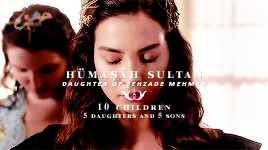
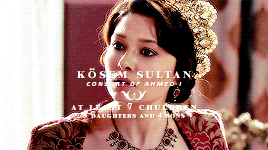
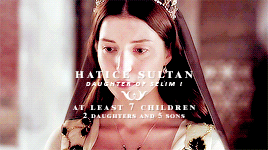
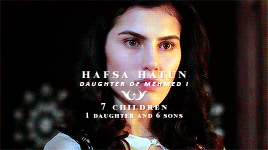
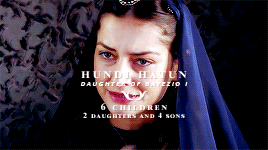
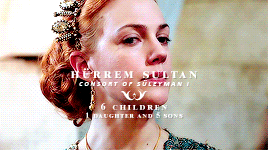
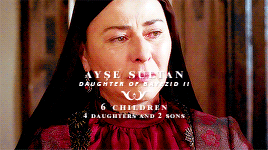
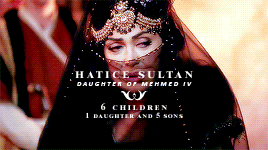
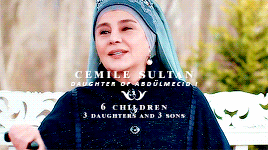
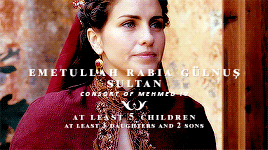
Ottoman women who had the most children
#history#historyedit#ottoman history#humasah sultan daughter of sehzade mehmed#kosem sultan#hatice sultan daughter of selim i#hafsa sultan daughter of mehmed i#fatma hundi hatun daughter of bayezid i#haseki hurrem sultan#ayse sultan daughter of bayezid ii#hatice sultan daughter of mehmed iv#cemile sultan daughter of abdulmecid i#emetullah rabia gulnus sultan#ottomanladiesedit
196 notes
·
View notes
Text
Süleyman & Sisters - Headcannons
- We never learn what the exact order of siblings is in the show, and it sure as hell isn’t the same as in history, otherwise I would have to believe Selma Ergeç is older than Halit Ergenç, which... NO. In my interpretation, Beyhan is the oldest, Süleyman is the second, Şah the third, Hatice fourth and Fatma the youngest.
- Hafsa, Şehzade a Gevherhan may still exist, but have different mothers than Süleyman. Şehzade and Gevherhan are much younger than Süleyman, so they don’t interact much. Hafsa is a year younger just like in history, but during childhood he interacts with her less than he does with his full-blooded sisters and after she marries, they grow apart completely. Şehzade and Gevherhan are still little girls when Süleyman leaves for Manisa, and after his ascention they live in the Old Palace untill marriage.
- Beyhan is the wise older sister that is mostly above it all and oh-so-much mature than her siblings. As a teenager, she hates Fatma, because she’s the only one whose shenanigans can penetrate her façade and either make her laugh or genuinely piss her off.
- Şah is close in age to Süleyman and there is this intense rivalry between them for their mothers’ affections. Because of this, despite receiving less impressive education from her tutors than her brother, she ends up knowing more than him at a younger age, just out of spite. Later, she becomes the smug intellectual of the group, and Hatice and Fatma think she’s a lame nerd.
- Hatice is the big softie who just wants to get along with everyone, and all of her sisters love her for that, except for Şah, who thinks she’s the lame one.
- Fatma is the baby of the family, spoiled by the whole family, untill she grows up into a hyperactive prankster. Sometimes, she is the most annoying kid in the world and Beyhan even jokes at her wedding that at least she’s getting away from Fatma.
- Süleyman is the favourite child of Ayşe Hafsa, both because he is Selim’s precious heir and because he’s her only surviving son. Selim, on the other hand, absolutely adores Şah, which is probably what kickstarts their increasingly bad relationship.
- Fatma’s first prank was during a celebratory dinner at Beyhan’s wedding, which leads to Ayşe Hafsa personally spanking her. This leads to a feud between her and Selim’s mother, who knows this is decidedly not a proper way to raise royal children.
- Şah used to have a massive crush on Ibrahim, that’s true, but she was, like, seventeen and in the she grew out of it pretty quickly. Namely when her new husband showed her his massive library.
- Fatma married that old dude from the beginning of season 4 was against her will, and for the first few years he spent a lot of time “visiting” (read running away to) her siblings, even half-sisters. She was forbidden from coming to Istanbul, however, because she was just that annoying, and the only reason she came back eventually was because Süleyman in his old age just forgot how annoying she can be.
- All of the girls were taught needlework as part of their education, but only Beyhan and Hatice kept it as a hobby untill adulthood. Şah gave up on needlework after Beyhan kept bragging about how much better she is at it, so Şah, unable to best her, came to the conclusion that needlework is stupid anyway. Fatma was never into it in the first place.
- Süleyman has drank wine several times in his life. Beyhan drinks wine exactly once, and that is at Süleyman’s prompting when visiting him at Manisa. Hatice does so several times when married to Ibrahim and every time she thinks she will like it, but doesn’t, so she’s mad at Ibrahim for giving her the idea. Fatma is of course the vodka (or rather raki) aunt of the family, that’s practically cannon. Şah has never drank a single drop of alcohol, because she’s the Good Muslim (tm) of the family and judges all the rest of them filthy heathens.
- Selim had several sisters, and they sometimes come to visit him and his family. Everyone dreads their visits, because they are super judgemental and hate Ayşe Hafsa for reasons that completely escape the kids.
- Ayşe Hafsa actually gets along pretty well with Selim’s mother, and his kids adore grandma. Unfortunately, she dies before Selim becomes a sultan. Fatma is her favourite grandchild and becomes extremely emotional at her funeral, inappropriately so, which Ayşe Hafsa writes off as just her making a scene for attention. In the end, only Hatice is able to console her.
- When Beyhan is a little kid and Şah just a toddler, she thinks Şah’s full name being long is the funniest shit ever, and can’t stop intentionally mispronouncing it. Süleyman agrees and sometimes joins her. Then three year old Şah starts to correct them, but at first she mispronounces it too, just unintentionally. Eventually, Beyhan stops thinking it’s funny, but it takes a while for Süleyman to catch on. Before that, he gets smacked by Şah several times for making fun of her name.
- Selim buys all of his daughters horses and tries to teach them how to ride. They are universally terrible at it, though it takes a while for Hatice to admit it, because she loves her horse and wants to be around it.
- Hatice as a little girl gets along with animals in general. When she’s five, she gets a cat as a gift from her dad, a Turkish angora. She names it Süleyman, loves it to bits and when the cat dies of old age, she is devastated and vows to never own any other cat. Fatma sometimes jokes that the reason she loves Ibrahim so much is because he reminds her of that cat.
26 notes
·
View notes
Text
Non real life sultanas
A little Christmas surprise post comes. One of my most popular videos on Youtube was the one, where I gathered non-historical characters, explaining how fictional or how historical they were, and if there was a real historical person behind them as an inspirer. Now, for Christmas, I would like to summarize for you the main fictional characters of the Muhteşem Yüzyil series.
Several fictional characters were present in the Muhteşem Yüzyil series, many from the very first minutes. The presence of some fictional characters was forgivable, as we were left with very little detailed information about the harem of Sultan Suleiman I. Thus, for example, the characters of Sümbül Agha, Gül Agha, Mercan Agha, and other eunuchs, although not portraying historical characters, were necessary for the dramaturgy of the series. Sümbül's character was the most important among the eunuchs and perhaps this is why many of us may think that Hürrem actually had such a close friend in the person of the chief eunuch. However, this is not true. During Suleiman's reign, many chief eunuchs took turns, and none of them were known to be particularly close to Hürrem. Of Hürrem's close servants, only one is known by name, a woman named Nevbahar. The characters of Nigar Kalfa, Gülsah Hatun, Fidan Hatun, Daye Hatun, Fahriye Kalfa were similar to Sümbül. None of them were historical, but surely every sultana had their own trusted servants, as they showed in the series. Like the eunuchs and kalfas, the concubines of Prince Mustafa and Prince Bayezid, Ayşe, Rana, Defne or Rumeysa Hatun, can also be considered forgivable fictional characters. We do not know anything about the harem of the two princes as neither of them had a major consort and as their children were born from different women.
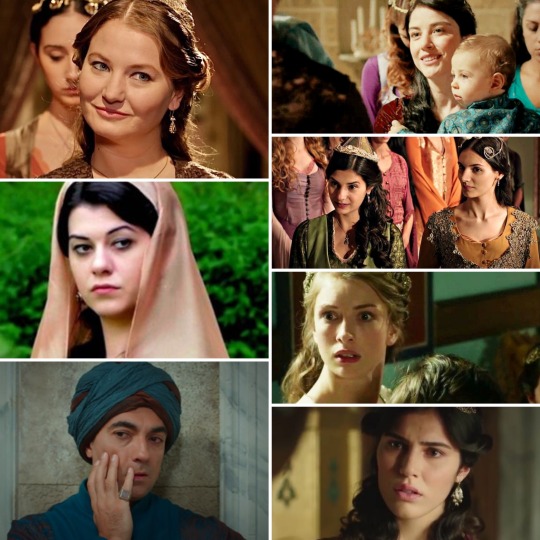
However, there were also characters who were written into the story just for the sake of the drama. Which of these characters was acceptable is up to everyone and feel free to write your opinion about them in a comment here or on another platform! So here's the long-awaited list:
Sadika Hatun
Sadika was a Hungarian woman in the series whose husband was killed by Sultan Suleiman on the day of their wedding. Sadika then became the spy of the Hungarian king, Lajos II and she traveled to Istanbul to personally avenge her husband’s death. Matrakci Nasuh Efendi then, by chance, meets the girl and helps her get into the harem, where she immediately joins Ayşe Hafsa Valide Sultan's service and then becomes Hatice Sultan’s chief servant. During her job, of course, she gets close to Suleiman's bed several times, and then she had the opportunity to attack the sultan. However, she does not succeed, Suleiman survives, and Sadika is thrown in the Bosphorus.
In reality, this story would not be possible at all. Even if we assumed that Sadika really existed and Suleiman actually killed her husband, she would not have been able to get into the Sultan's harem and take revenge. On the one hand, Sadika was already a married woman, an adult woman. Such women could not enter the harem, only virgin, child girls could become the sultan's later concubines. However, even if Sadika had somehow been able to get in the harem, a long education would have awaited her before she could join the Valide Sultan's service. While there may have been some exceptional cases where older or non-virgin women wanted to be gifted to the Sultan, these are special cases. Such was the case, for example, when Hayreddin Barbarossa wanted to kidnap the beautiful Giulia Gonzaga, a widowed Italian noblewoman known far and wide, to send her to the Sultan's harem as a gift. In the end, he didn’t succeed, but even if he did, we don’t know if the sultan would had ever taken the woman to his bed.
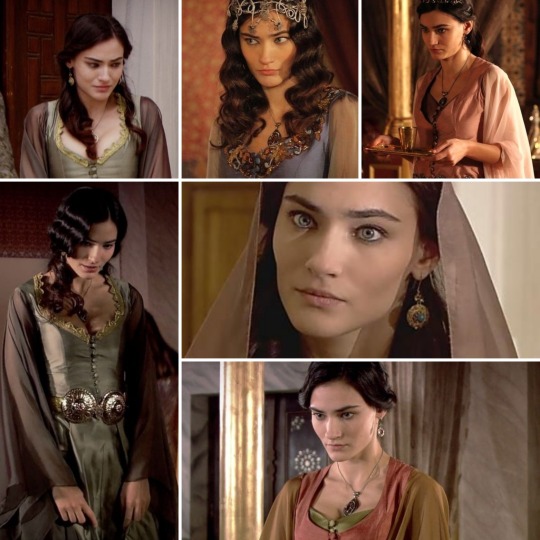
Leo
In the series, he was the love of Hürrem from their youth. Leo came to Istanbul with the goal of finding her former sweetheart. Leo is a talented artist who, with the help of Nasuh Efendi (ahh Nasuh brought all the good people near to the Sultan…) will become the painter of Sultan Suleiman and Pargali Ibrahim. His former relationship with Hürrem will soon be revealed to Pargali Ibrahim, who is thus trying to blackmail Hürrem. Hürrem repeatedly begs Leo to leave the capital, but the man remains, which eventually leads to his death.
In reality, Hürrem - and all the other concubines - were taken into Ottoman captivity as little girls, so it is out of the question that they would have had a love or a fiance. And even if they had, they could never have found them. Nasuh Efendi, though one of the greatest suckers in the series - yet the dearest character - was not like that in reality at all, but he was a wonderful scholar who, by the way, was not so closely friends with either Sultan Suleiman or Pargali Ibrahim.
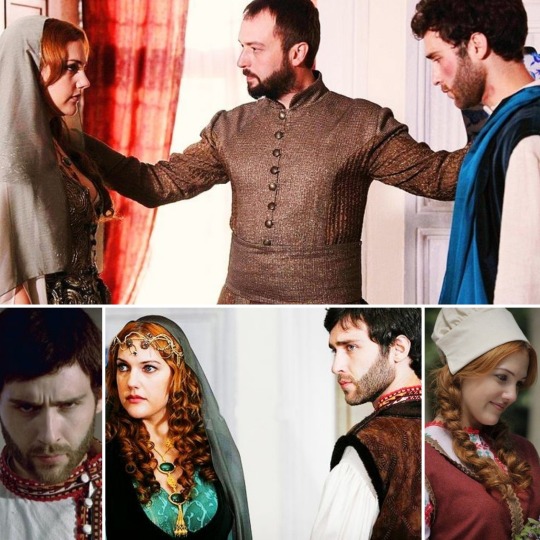
Princess Isabella
Princess Isabella Fortuna was a Spanish noble lady in the series who was on a ship to her future husband, the Austrian prince, when she was captured by Ottoman pirates and was taken to Istanbul to Sultan Suleiman. At first, Suleiman was only interested in the princess for political reasons, but later he fell in love. Princess Isabella initially resisted Suleiman's approach with all her cartilage, but over time she fell in love with the sultan and became his lover. This, of course, Hürrem could not stand and did everything she could to get rid of the princess who was eventually sent home by Suleiman himself.
In reality, of course, such a situation would have been unthinkable. Even assuming that Isabella existed and was captured by pirates, no princess raised in the Catholic faith would have voluntarily become the concubine of a Muslim sultan, she would have committed suicide instead. Let us not forget that Suleiman was loyal to Hürrem from the 1520s onwards, so in reality there was not a single woman who could make hard time for Hürrem during her decades-long relationship with Suleiman. Isabella Fortuna, on the other hand, never existed. Surprisingly, however, they could have patterned her from a real character. There was an Isabella of Castile in this period who was born in 1518 as the child of the widowed Queen of Aragon, Germaine of Foix and Charles V, but she was never captured by Ottoman pirates and was never the bride of the Austrian prince. Isabella's existence was kept secret by her parents all her life, only her mother's testament revealed that she ever existed. It is also known from there that Isabella died young in 1537.
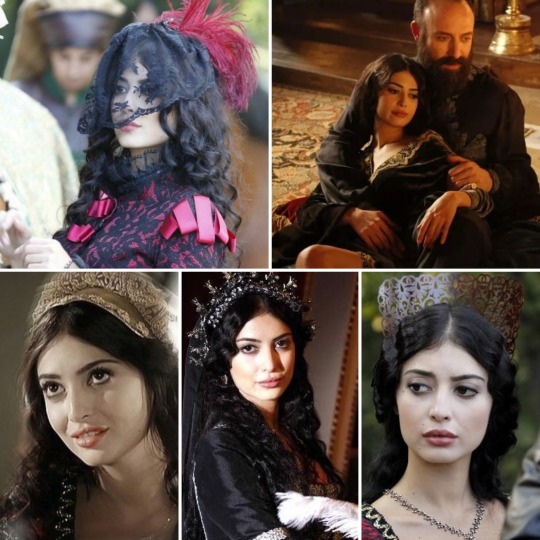
Aybige Hatun
In the series, Aybige was the niece of Ayşe Hafsa, and so the daughter of the Crimean Sahib Giray khan. Aybige originally only came to visit her aunt in Istanbul, but later Hafsa Sultan wanted to see her as the wife of her favorite grandson, Prince Mustafa. However, Aybige was in love with Bali Bey and Mustafa longed for someone else aksi. Bali Bey was eventually almost executed for their love, and Aybige returned to Crimea with her father in the end.
Aybige’s storyline makes mistakes at almost every point. First, Ayşe Hafsa was never the sister of the Crimean khan, so the daughter of the Crimean khan could not have been her niece either. In addition, although Sahib Giray Khan had several daughters, none were called Aybige and none of his daughters ever traveled to Istanbul. The only true point in the whole storyline is that Sahib Giray Khan really collaborated with Sultan Suleiman in his Moldovan war. It is also important to mention Bali Bey at this point. Although Bali Bey was a real historical figure, there is not the slightest match between historical Bali Bey and the series Bali Bey. The real Bali Bey was not a romantic guy who fell in love with every second woman. Bali Bey was a cruel warlord. And if it comes to Bali Bey, let’s say a few words about Prince Mustafa as well. The idea of wanting to marry Mustafa to a khan’s daughter is completely absurd! Since the reign of Sultan Mehmed II, princes have been forbidden to marry anyone, so Prince Mustafa has not been allowed to marry anyone either. And the fact that Suleiman would have supported the idea - even if such a marriage had been able to occurre at all - is an even greater absurdity. Suleiman did not want Mustafa as his heir, so he would never have given him as much power as the support of the Crimean khan.
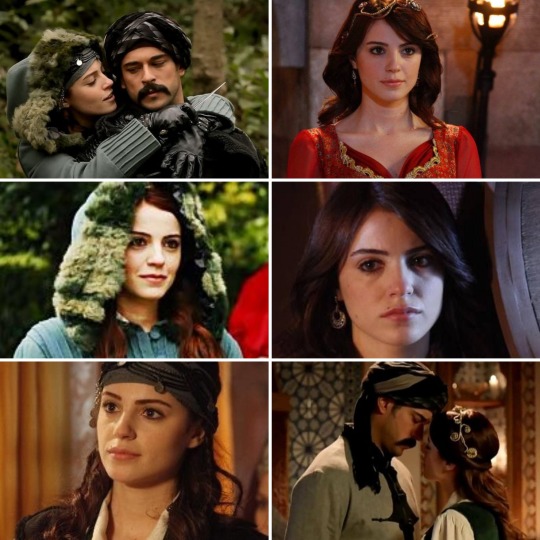
Firuze Hatun
In the series, Firuze was a Persian spy who, with her amazing abilities, was able to heal the pains of the sick Prince Cihangir, earning the love of Hürrem Sultan. Firuze, however, thanked Hürrem kindness in a disgusting way, and became Suleiman's secret lover, whom the sultan fell in love with. In the end, Hürrem was only able to overcome Firuzen with a little, Firuze was eventually exiled from the palace so she could return to Persia.
In reality, Suleiman was loyal to Hürrem, living in a monogamous relationship with her. Even if there was an occasional one-night-stands, Suleiman never fell in love with another woman, only Hürrem. Thus, the Firuze storyline has already failed here. The fact that there was a Persian spy in the harem would have been an interesting suggestion though. There were certainly spies in the royal court of every empire, but they were probably not hiding among the concubines. Eunuchs, for example, moved with much greater freedom, were much better candidates for being a spy…
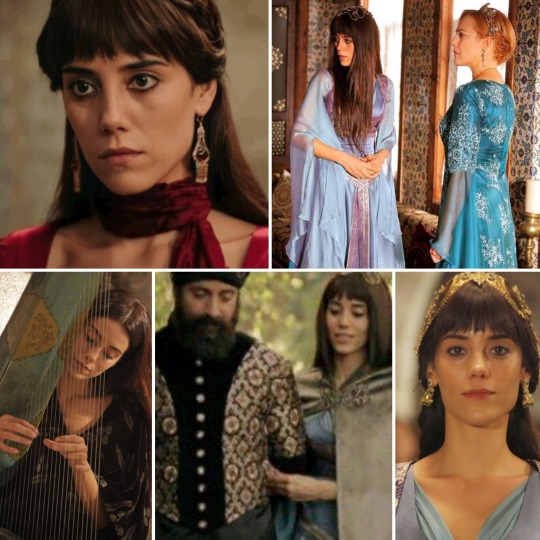
Huricihan Sultan
In the series, Huricihan was the daughter of Ibrahim Pasha and Hatice Sultan, who grew up in the palace of Beyhan Sultan after the death of her parents. From there she returned to Istanbul, where she fell in love with her first cousin, Prince Bayezid. Their love became a relationship and then marriage without the Sultan’s permission. Huricihan became the head of Bayezid's harem and soon her relationship with Hürrem and Suleiman slowly became better. Huricihan's end eventually was brought by Prince Selim's concubine, Nurbanu, who knocked her out in the heat of a dispute, killing her.
In reality, Hatice and Ibrahim Pasha were never married, so they didn't have children either together, so Huricihan never existed. If she had existed, for the reasons already mentioned, it would have been utterly inconceivable for Bayezid to marry her, either secretly or openly. Especially knowing that Bayezid had never had a favourite singled out concubine, as all of his children were born to different women. With a background like this, it’s unlikely he’d ever wanted to marry anyone. Although Hatice Sultan did indeed have a daughter, she was born between 1510 and 1515, so she was well ahead of Bayezid in age, and of course she had nothing to do with the prince and was not even called Huricihan.
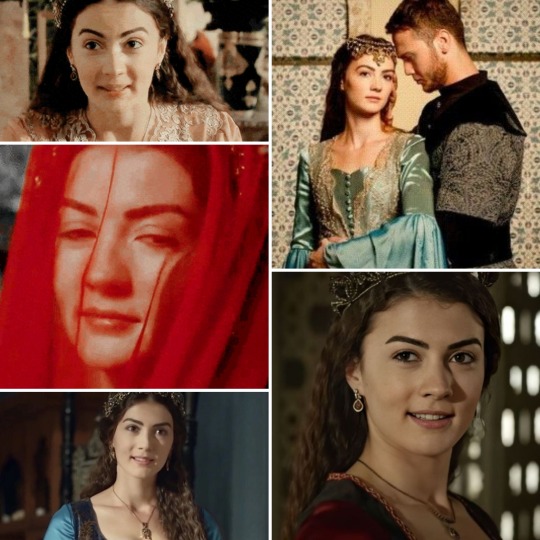
Mihrünissa Hatun
In the series, Mihrünissa was the daughter of Hayreddin Barbarossa the Head of the Fleet, whom her father sent to Prince Mustafa as a consultant. Later, the two young person fell in love with each other and married without the Sultan's knowledge. In time, Mihrünissa also gave birth to Mustafa's son Mehmed. After Prince Mustafa and his son Mehmed were executed, Mihrünissa went to the capital and cut her own throat before Hürrem's eyes.
In reality, for the reasons already detailed several times above, no prince could marry anyone, so Mustafa also never married. In addition, Barbarossa never had a daughter named Mihrünissa and Hayreddin Pasha was never a supporter of Prince Mustafa. However, even assuming that Mihrünissa existed, there is no chance that she could have committed suicide before Hürrem's eyes. Prince Mustafa's harem retired to Bursa, so that no member of the harem could travel to the capital, especially not to the palace and kill herself in front of Hürrem. So, in fact, the Mihrünissa storyline was just 100% fiction.
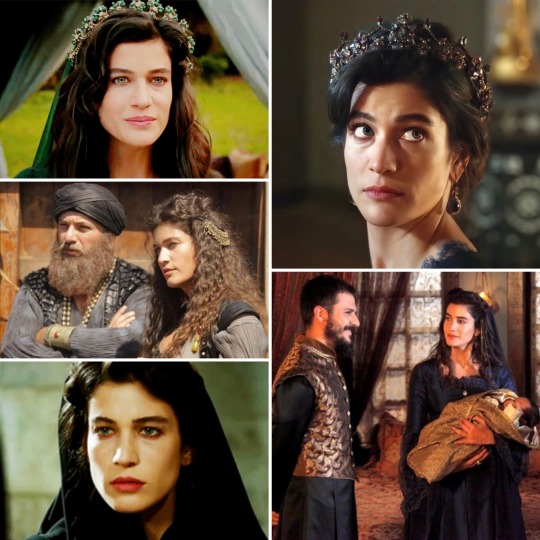
Nazenin Hatun
In the series, Nazenin arrived in Istanbul with Nurbanu, where Hürrem, who was struggling with menopause, sent her to the sultan herself. Nazenin thus became the sultan's concubine and soon gave birth to a daughter, Raziye Sultan. Eventually, on Hürrem's instructions, she was killed by Nurbanu.
In reality, as I have said many times, Suleiman was loyal to Hürrem. In addition, after the birth of Prince Cihangir in 1531/2, Suleiman had no more children, neither to Hürrem nor to anyone else. It is true that he had a daughter named Raziye, however, the child died in 1520 at the age of a few years as a result of an epidemic.
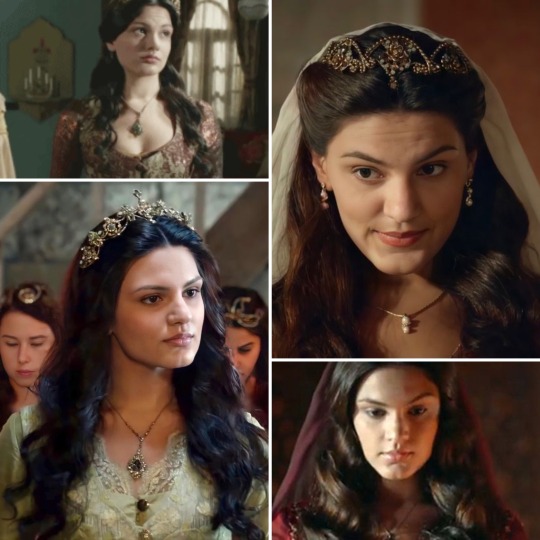
Surprising realities
After many fictional characters, one would think that all eunuchs and kalfas were fictional characters, as we know quite a bit about the harem. However, this is not true! There were some historically inspired characters, such as Gazanfer Agha, who, although existed and was one of the most influential eunuchs ever, was not a loyal man of Nurbanu, but Sultan Selim II. Gazanfer reached the peak of his career, by the way, during the reign of Safiye Sultan.
Similarly historical was Canfeda Hatun, who was Nurbanu’s most loyal servant and one of the most influential kalfas of her era. True, Canfeda’s character in the series was a fusion of two loyal servants of historic Nurbanu. In her young age, in the princely harem of Selim, Nurbanu became acquainted not with Canfeda but with another kalfa, who remained her faithful servant for the rest of her life. Canfeda only became Nurbanu’s main supporter during Selim’s reign.
Like them, Afife Hatun’s character was partly real also. Sultan Suleiman's wetnurse was really called Afife and the sultan always kept in touch with the woman. However, Afife Hatun never moved to Istanbul to rule the Sultan’s harem, but lived a simple life.
Gracia Mendes Nasi was introduced last season as a wealthy Portuguese Jewish woman who helped Portuguese refugees get to Istanbul. Later, Gracia became the lover of Grand Vizier Rüstem Pasha, which made her an enemy of Mihrimah Sultan. In reality, Gracia Mendes was a very benevolent soul who was committed to Jewish traditions and her Jewish brothers. She was never a lover of Rustem and an enemy of Mihrimah. However, like the series, Gracia actually enjoyed the Sultan’s support and, with his help, she made great improvements in Istanbul’s Jewish Quarter and helped many refugees start a new life in the Ottoman Empire.
One of the most interesting guest actors of the last season of the series was Anna Jagello, the daughter of the former King of Poland, the sister of the new King of Poland. Although the woman was a real historical figure, the historical Anna never traveled to Istanbul and never corresponded with Hürrem Sultan. However, Hürrem exchanged letters several times with Anna's mother Bona Sforza, Anna's father, King Sigismund I of Poland, and Anna's brother, the later Zsigmond Ágost II king of Poland, and even Anna's sisterm Isabella, the Hungarian queen. Thanks to the intercession of Hürrem, the relationship between the Kingdom of Poland and the Ottoman Empire was quite good and almost friendly during Suleiman's reign.
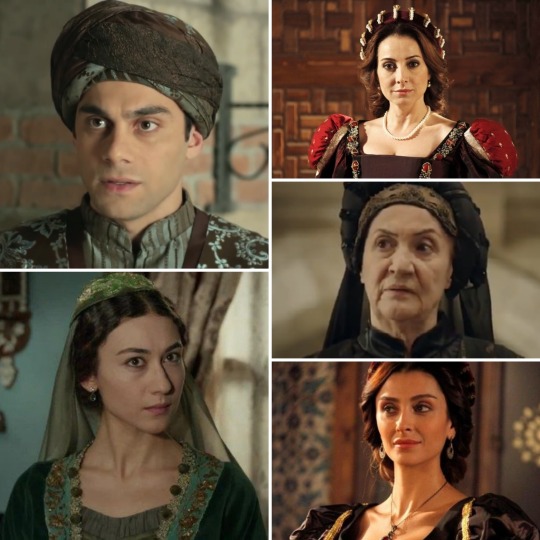
* * *
Egy kis karácsonyi meglepetés poszt következik. Youtube-on az egyik legnépszerűbb videóm az volt, amelyben a nem történelmi karaktereket gyűjtöttem össze, elmagyarázva, mennyire voltak kitaláltak, mennyire volt mögöttük egy-egy valós történelmi személy, mint ihlető. Most karácsony alkalmából szeretném nektek összefoglalni a Muhteşem Yüzyil sorozat főbb kitalált karaktereit és történetüket.
A Muhteşem Yüzyil sorozatban több kitalált karakter is jelen volt, sokan már az első percektől kezdve. Egyes kitalált karakterek jelenléte megbocsátható volt, hiszen nagyon kevés részlet maradt ránk a Szulejmán háremében jelenlévő személyekről. Így például Sümbül Aga, Gül Aga, Mercan Aga és más eunuchok karakterei bár nem valódi személyeket keltenek életre, szükségesek voltak a sorozat dramaturgiája szempontjából. Sümbül karaktere volt a legfontosabb az eunuchok között és talán emiatt sokan gondolhatjuk úgy, hogy Hürremnek a valóságban is volt egy ilyen közeli barátja a fő eunuch személyében. Azonban ez nem igaz. Szulejmán uralkodása alatt rengeteg főeunuch váltotta egymást és egyikről sem ismert, hogy különösebben közel álltak volna Hürremhez. Hürrem közeli szolgálói közül csupán egy ismert név szerint, egy Nevbahar nevű nő. Sümbülhöz hasonló volt Nigar Kalfa, Gülsah Hatun, Fidan Hatun, Daye Hatun, Fahriye Kalfa karaktere is. Egyikük sem valós személy volt, ám bizonyosan minden szultánának megvoltak a saját megbízható szolgálói, ahogy ezt a sorozatban is mutatták. Hasonlóan az eunuchokhoz és kalfákhoz megbocsátható füllentésnek tekinthetőek Musztafa herceg és Bayezid herceg ágyasai is, Ayşe, Rana, Defne vagy Rumeysa Hatun. A két herceg asszonyairól ugyanis semmit sem tudunk, egyiküknek sem volt kiemelt jelentőségű főágyasa, gyermekeik más-más nőktől születtek.
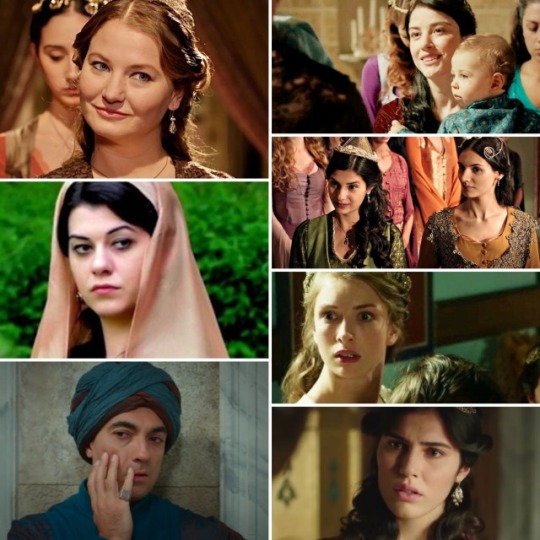
Voltak azonban olyan karakterek is, akiket csupán a dráma kedvéért írtak bele a történetbe. Az, hogy ezek közül melyik karakter mennyire volt elfogadható, azt mindenki maga döntse el és nyugodtan írja meg kommentben itt vagy más platformon, hogy mit gondol róluk! Következzék hát a várva várt lista:
Sadika Hatun
Sadika a sorozatban egy magyar nő volt, akinek férjét az esküvőjük napján megölte Szulejmán szultán. Sadika ezek után a magyar király, II. Lajos parancsára Isztambulba utazott, hogy ott személyesen bosszulja meg férje halálát. Matrakci Nasuh Efendi aztán egy véletlen folytán megismerkedik a lánnyal és segít neki bekerülni a hárembe, ahol azonnal Ayşe Hafsa Valide Sultan szolgálatába áll, majd Hatice Sultan főszolgálója lesz. Menetközben természetesen többször is Szulejmán ágyának közelébe kerül, majd lehetősége nyílik a szultánra támadni. Azonban nem jár sikerrel, Szulejmán életben marad, Sadikát pedig a Boszporuszba fojtják.
A valóságban ez a történetszál egyáltalán nem lenne lehetséges. Ha feltételeznénk is azt, hogy Sadika valóban létezett és Szulejmán valóban megölte a férjét, akkor sem állt volna módjába bejutni a szultáni hárembe és bosszút állni. Egyrészt Sadika férjezett asszony volt már, felnőtt nő. A hárembe nem kerülhettek be ilyen nők, csupán szűz, gyermeklányokból válhattak a szultán ágyasai. Mindazonáltal ha Sadika valahogy mégis bekerült volna a hárembe hosszadalmas oktatás várt volna rá, mielőtt a Valide Sultan szolgálatába állhatott volna. Előfordulhatott ugyan néhány kivételes eset, amikor idősebb vagy nem szűz nőket akartak volna a szultánnak ajándékozni, azonban ezek különleges esetek. Ilyen volt például, amikor Hayreddin Barbarossa el akarta rabolni a messze földön ismert, gyönyörű Giulia Gonzagát, megözvegyült itáliai nemesasszonyt, hogy a szultán háremébe küldje ajándéknak. Végül nem járt sikerrel, ám ha sikerrel járt volna is, nem tudni, hogy a szultán valaha is ágyba vitte volna-e a nőt.
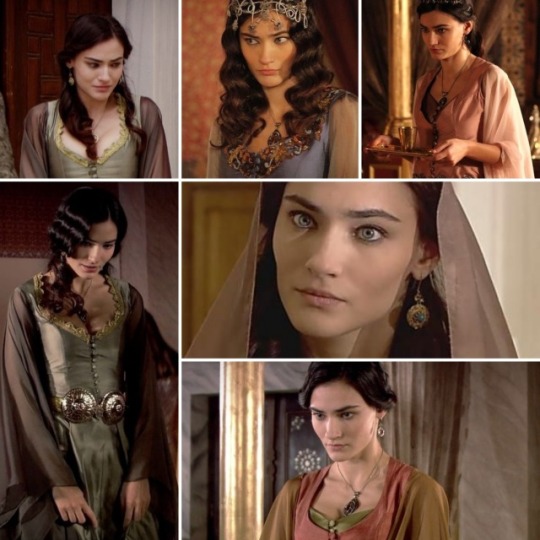
Leo
A sorozatban Leo Hürrem fiatalkori szerelme volt, aki azzal a céllal érkezett Isztambulba, hogy megtalálja egykori kedvesét. Leo tehetséges művész, aki Nasuh Efendi segítségével (ahh Nasuh csupa jó embert juttatott a szultán közelébe…) Szulejmán szultán és Pargali Ibrahim festője lesz. Egykori viszonya Hürremmel hamarosan kiderül Pargali Ibrahim számára, aki ezzel próbálja zsarolni Hürremet. Hürrem többször könyörög Leonak, hogy hagyja el a fővárost, de a szerelmes férfi marad, ami végül halálához vezet.
A valóságban Hürrem – és minden más ágyas – még kislányként került oszmán fogságba, tehát kizárt, hogy szerelmük vagy vőlegényük lett volna, ha pedig mégis, az sosem tudott volna rájuk találni. Nasuh Efendi, pedig aki a sorozat egyik legnagyobb baleke – ugyanakkor legkedvesebb karaktere – a valóságban egyáltalán nem ilyen volt, hanem egy csodálatos tudós, aki egyébként nem állt ilyen közeli barátságban sem Szulejmán szultánnal, sem Pargali Ibrahimmal.
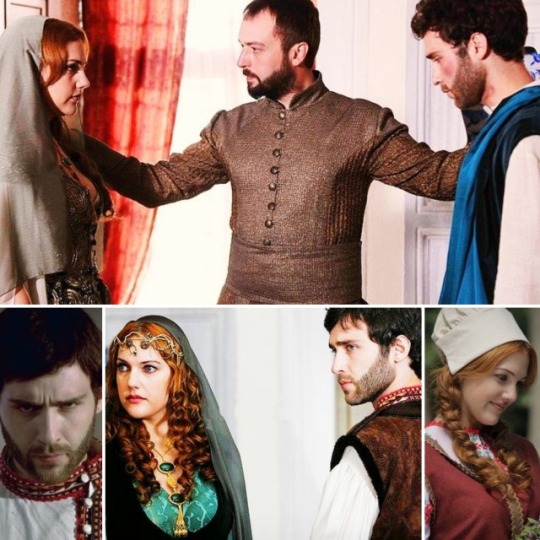
Izabella Hercegnő
Izabella Fortuna hercegnő a sorozatban egy spanyol nemes hölgy volt, aki éppen jövendőbeli férjéhez, az osztrák herceghez tartott hajón, mikor az oszmán kalózok elragadták és Isztambulba vitték Szulejmán szultán elé. Először Szulejmán politikai okokból érdeklődött csupán a hercegnő iránt, később azonban beleszeretett. Izabella hercegnő eleinte minden porcikájával ellenállt Szulejmán közeledésének, idővel azonban beleszeretett a szultánba és a szeretője lett. Ezt természetesen Hürrem szultána nem állhatta és mindent megtett, hogy megszabaduljon a hercegnőtől, akit végül Szulejmán küldött el.
A valóságban természetesen elképzelhetetlen lett volna egy ilyen szituáció. Ha feltételezzük is, hogy Izabella létezett és a kalózok fogságába esett, egyetlen katolikus hitben nevelt hercegnő sem vált volna szabad akaratából a szultán ágyasává, előbb lett volna öngyilkos. Azt se felejtsük el, hogy Szulejmán az 1520-as évektől kezdve hűséges volt Hürremhez, a valóságban nem volt egyetlen nő sem, aki éket verhetett volna közéjük több évtizedes kapcsolatuk alatt. Másrészről pedig Izabella Fortuna sosem létezett. Meglepő azonban, hogy valós karakterről mintázhatták. Létezett egy Kasztíliai Izabella ebben a korban, aki 1518-ban született az özvegy aragóniai királyné Germaine Foix és V. Károly gyermekeként, azonban sosem esett oszmán kalózok csapdájába és sosem volt az osztrák herceg menyasszonya. Izabella létezését egész életében titokban tartották szülei, csupán édesanyja végrendeletéből derült fény arra, hogy valaha is létezett. Innen tudni azt is, hogy Izabella fiatalon elhunyt 1537-ben.
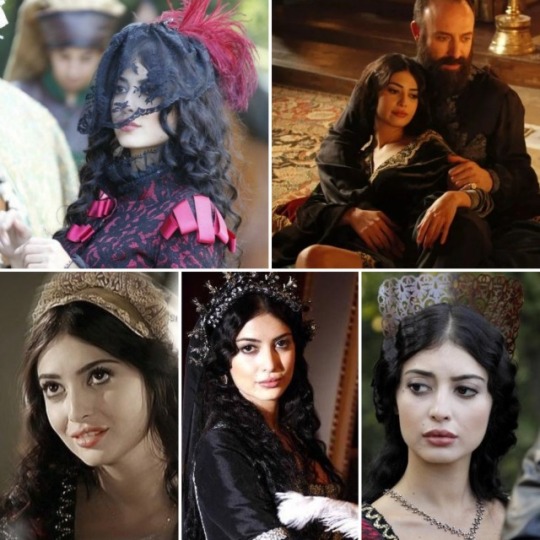
Aybige Hatun
A sorozatban Aybige Ayşe Hafsa Sultan unokahúga volt, a krími Sahib Giray kán lánya. Aybige eredetileg csak látogatóba érkezett Isztambulba, később azonban nagynénje szerette volna őt kedvenc unokája, Musztafa herceg feleségeként látni. Aybige azonban Bali Bégbe volt szerelmes és Musztafa is más után vágyakozott. Bali Béget végül majdnem kivégezték a szerelmük miatt, Aybige pedig apjával visszatért a Krímre.
Aybige történetszála szinte minden létező ponton hibádzik. Először is, Ayşe Hafsa sosem volt a Krími kán testvére, tehát a krími kán lánya sem lehetett az unokahúga. Emellett Sahib Giray kánnak bár több lánya volt, egyiket sem hívták Aybigének és egyik lánya sem utazott sosem Isztambulba. Az egész történetszál egyetlen igaz pontja, hogy Sahib Giray kán tényleg együttműködött Szulejmán szultánnal annak moldáv háborújában. Fontos megemlíteni ezen a ponton Bali Béget is. Bali Bég bár valós történelmi személy volt, de a legkisebb egyezés sincs a történelmi Bali Bég és a sorozat Bali Bége között. A valódi Bali Bég nem egy romantikus fickó volt, aki minden második nőbe beleszeretett, és akiért bolondultak a nők. Bali Bég egy kegyetlen hadvezér volt. És ha már Bali Bég szóba jött, ejtsünk néhány szót Musztafa hercegről is. Az ötlet, hogy Musztafát egy kán lányához akarják adni teljesen abszurd! II. Mehmed szultán uralkodása óta tilos volt a hercegeknek házasságot kötni, így Musztafa herceg sem köthetett senkivel házasságot. Az pedig, hogy Szulejmán támogatta volna az ötletet, már ha egyáltalán felmerült volna egy ilyen házasság, még nagyobb abszurdum. Szulejmán nem Musztafát akarta örökösének, így sosem adott volna a kezébe akkora hatalmat, mint a krími kán támogatása.
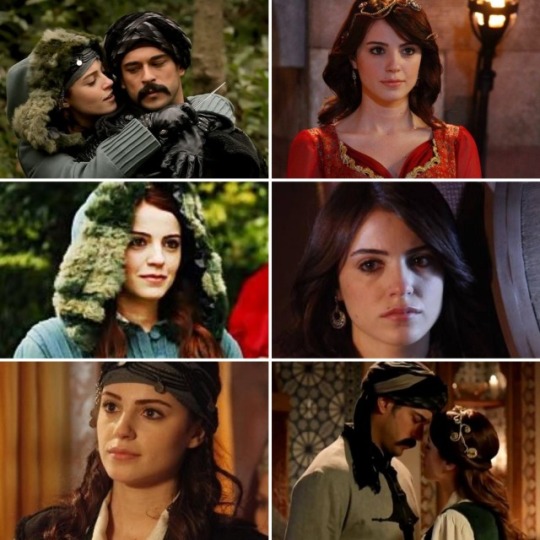
Firuze Hatun
A sorozatban Firuze egy perzsa kém volt, aki csodálatos képességeivel gyógyítani tudta a beteges Cihangir herceg fájdalmait, amivel kiérdemelte Hürrem szeretetét. Firuze azonban rút módon hálálta meg Hürrem kedvességét, ugyanis Szulejmán titkos szeretője lett, akibe a szultán halálosan beleszeretett. Végül Hürrem csak egy hajszállal volt képes felülkerekedni Firuzén, akit végül száműztek a palotából, így visszatérhetett Perzsiába.
A valóságban Szulejmán hűséges volt Hürremhez, monogám kapcsolatban éltek. Ha előfordult is alkalomadtán egy-egy egyéjszakás kaland, Szulejmán soha nem szeretett bele más nőbe, csak Hürremet szerette. Így a Firuze történetszál már itt el is bukott. A tény, hogy Firuze perzsa kém lett volna érdekes felvetés, bizonyára akadtak kémek minden birodalom királyi udvarába, azonban ők valószínűleg nem az ágyasok között rejtőztek. Az eunuchok például, sokkal nagyobb szabadsággal mozogtak, sokkal könnyebben lefizethetők voltak…
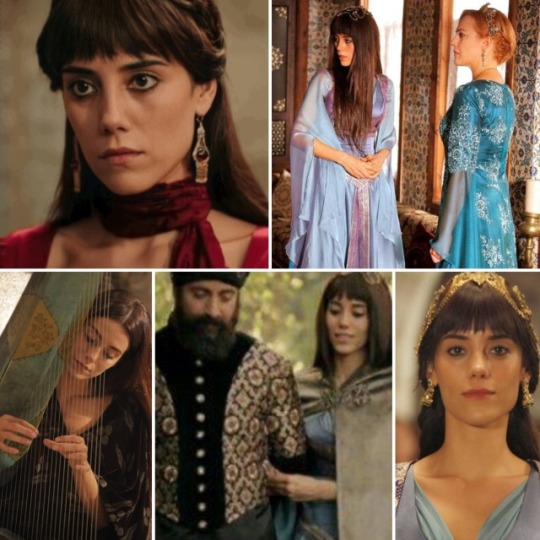
Huricihan Sultan
A sorozatban Huricihan Ibrahim Pasa és Hatice Sultan lánya volt, aki szülei halála után Beyhan Sultan palotájában nevelkedett. Onnan tért vissza Isztambulba, ahol beleszeretett elsőunokatestvérébe, Bayezid hercegbe. Szerelmükből kapcsolat, majd házasság lett a szultán engedélye nélkül. Huricihan Bayezid háremének feje lett és kapcsolata lassanként rendbejött Hürremmel és a szultánnal is. Huricihan végzete végül Szelim herceg ágyasa, Nurbanu lett, aki egy vita hevében leütötte őt, ezzel megölve.
A valóságban Hatice és Ibrahim Pasa sosem voltak házasok, így gyermekük sem született, tehát Huricihan sosem létezett. Ha létezett volna is, a már korábban említett okokból teljesen elképzelhetetlen lett volna, hogy Bayezid feleségül vegye őt akár titokban, akár nyíltan. Különösen tudva, hogy Bayezidnek nem volt sosem kiemelt ágyasa, minden gyermeke más nőtől született. Ilyen háttérrel nem valószínű, hogy valaha is feleségül akart volna venni bárkit. Hatice Sultannak bár valóban volt egy lánya, az 1510-1515 között született, így korban jóval megelőzte Bayezidet, és természetesen sosem volt semmi köze a herceghez és nem is Huricihannak hívták.
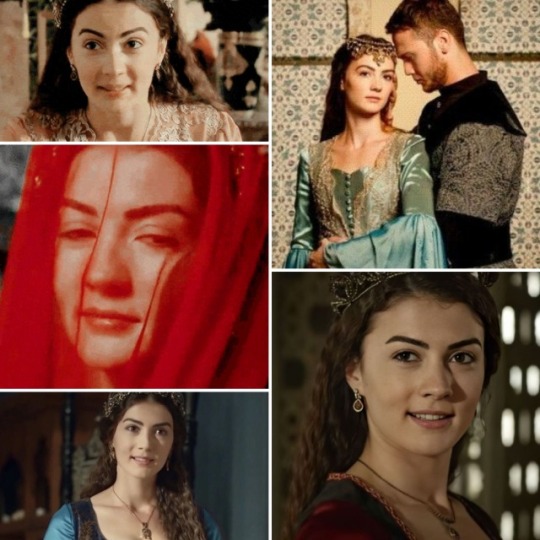
Mihrünissa Hatun
A sorozatban Mihrünissa Hayreddin Barbarossa flotta parancsnok lánya volt, akit édesapja küldött Musztafa herceg mellé tanácsadónak. Később a két fiatal egymásba szeretett és a szultán tudta nélkül egybe keltek. Idővel Mihrünissa életet adott Musztafa fiának, Mehmednek is. Miután Musztafa herceget és vele együtt fiát, Mehmedet is kivégezték, Mihrünissa a fővárosba ment és Hürrem szeme láttára elvágta a saját torkát.
A valóságban a már fent többszörösen részletezett okok miatt egy herceg sem köthetett házasságot, így Musztafa sem nősült meg soha. Emellett Barbarossának sosem volt Mihrünissa nevű lánya és Hayreddin Pasa sohasem volt Musztafa herceg támogatója. Ha azonban feltételeznénk is, hogy Mihrünissa létezett, nincs arra esély, hogy Hürrem szeme láttára lehetett volna öngyilkos. Musztafa herceg háreme Bursába vonult vissza, így a hárem egyik tagja sem utazhatott egyetlen percre sem a fővárosba, nemhogy a palotába, Hürrem elé. Így tulajdonképpen a Mihrünissa történet-szál 100%-ban kitaláció volt.
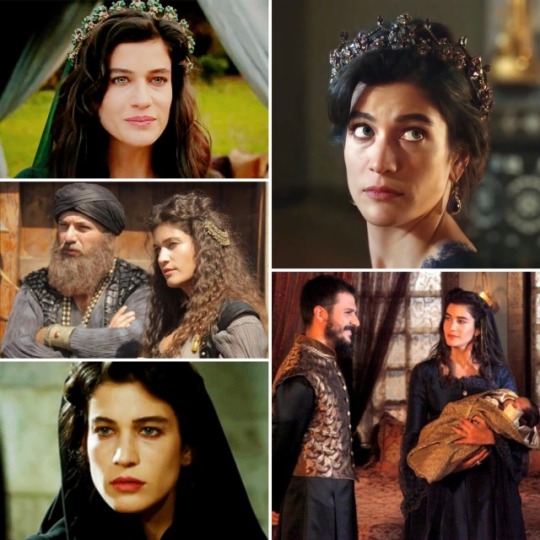
Nazenin Hatun
A sorozatban Nazenin Nurbanuval együtt érkezett Isztambulba, ahol aztán a menopauzával küszködő Hürrem maga küldte őt a szultán elé. Nazenin így a szultán ágyasa lett és hamarosan egy lánygyermeknek, Raziye Sultannak adott életet. Végül Hürrem utasítására Nurbanu ölte meg.
A valóságban, mint már sokszor mondtam, Szulejmán hűséges volt Hürremhez. Emellett Cihangir herceg 1531/2-es születése után Szulejmán nem nemzett több gyermeket, sem Hürremnek sem másnak. Az igaz, hogy volt egy Raziye nevű kislánya, azonban a gyermek 1520-ban néhány éves korában elhunyt egy járvány következtében.
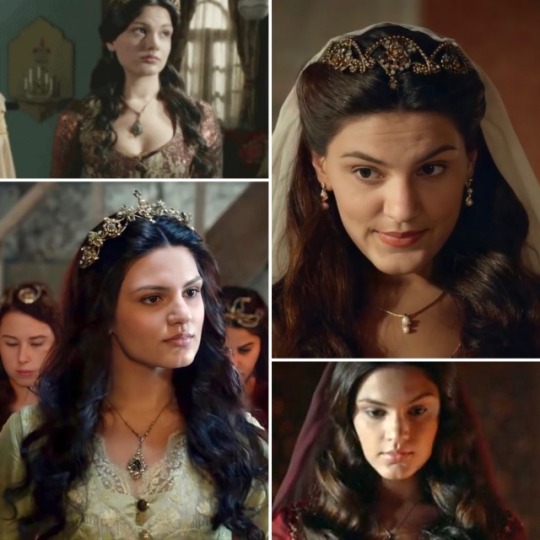
Meglepő valóságok
A sok kitalált karakter után azt gondolhatnánk, hogy az összes eunuch és kalfa kitalált karakter volt, hiszen meglehetősen keveset tudunk a háremről. Azonban ez nem igaz! Volt néhány történelmi ihletésű karakter, mint például Gazanfer Aga, aki bár létezett, és a valaha volt egyik legbefolyásosabb eunuch volt, nem Nurbanu hű embere volt, hanem II. Szelim szultáné. Gazanfer pályája csúcsát egyébként Safiye Sultan uralkodása alatt érte el.
Hasonlóan valós volt Canfeda Hatun is, aki Nurbanu leghűségesebb szolgálója volt és az egyik legbefolyásosabb kalfája korának. Igaz, Canfeda sorozatbeli karaktere, a történelmi Nurbanu két hűséges szolgálójának ötvözéseként született meg. Nurbanu fiatal korában, Szelim hercegi háremében nem Canfedával, hanem egy másik kalfával ismerkedett meg, aki élete végéig hűséges szolgálója maradt. Canfeda csak Szelim uralkodása alatt került képbe és vált Nurbanu fő segítőjévé.
Hozzájuk hasonlóan Afife Hatun karaktere is részben valós volt. Szulejmán szultán szoptatósdajkáját tényleg Afifének hívták és a szultán mindig tartotta a kapcsolatot az asszonnyal. Azonban Afife Hatun sosem költözött Isztambulba, hogy irányítsa a szultáni háremet, hanem egyszerű életet élt.
Gracia Mendes Nasi az utolsó évadban került bemutatásra, mint gazdag portugál zsidóasszony, aki portugál menekülteknek segített Isztambulba jutni. Később Gracia a nagyvezír Rüsztem Pasa szeretője lett, aminek köszönhetően szembe került Mihrimah szultánával. A valóságban Gracia Mendes igen jótét lélek volt, aki elkötelezett volt a zsidó hagyományok és zsidó testvérei iránt. Sosem volt Rüsztem szeretője és Mihrimah ellensége. Azonban a sorozathoz hasonlóan, Gracia a valóságban is élvezte a szultán támogatását és segítségével nagy fejlesztéseket vitt véghez Isztambul zsidó negyedében és nagyon sok menekültnek segített új életet kezdeni az Oszmán Birodalomban.
A sorozat utolsó évadának egyik legérdekesebb vendégszereplője Jagelló Anna volt, az egykori lengyel király lánya, az új lengyel király testvére. Bár az asszony valós történelmi személy volt, a történelmi Anna sosem utazott Isztambulba és sosem levelezett Hürrem szultánával. Azonban Hürrem többször is váltott levelet Anna édesanyjával Bona Sforzával, Anna édesapjával, I. Zsigmond lengyel királlyal, valamint Anna testvérével, a későbbi II. Zsigmond Ágost lengyel királlyal, sőt Anna másik testvérével Izabella, magyar királynővel is. Hürrem közbenjárásának köszönhetően Szulejmán uralkodása alatt meglehetősen jó, szinte baráti volt a viszony a Lengyel Királyság és az Oszmán Birodalom között.
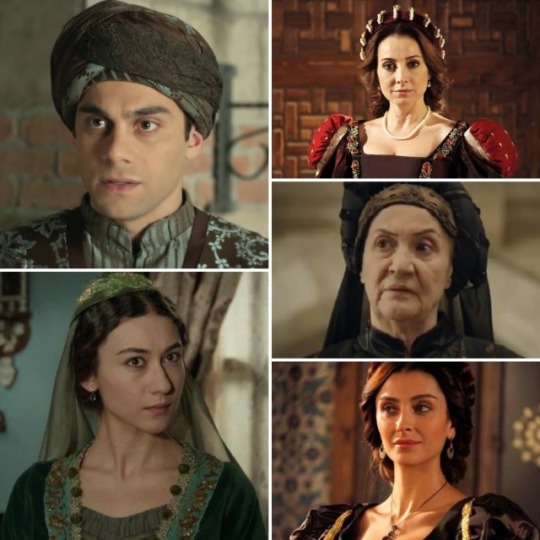
#selim ii#gazanfer agha#gazanfer#suleiman the magnificent#safiye sultan#suleiman i#suleyman i#haseki hürrem sultan#hürrem sultan#nurbanu sultan#aybige hatun#ayse hafsa#ayse hafsa sultan#princess isabella#firuze#firuze hatun
101 notes
·
View notes
Photo




Mother and daughter-in-laws in period dramas:
1. Handan Sultan + Mahpeyker Kosem Sultan- Muhtesem Yuzyil: Kosem
2. Catherine de Medici + Mary, Queen of Scots- Reign
3. Ayse Hafsa Sultan + Mahidevran Sultan- Muhtesem Yuzyil
4. Mahpeyker Kosem Sultan + Turhan Hatice Sultan- Muhtesem Yuzyil: Kosem
#muhtesem yuzyil kosem#muhtesem yuzyil#magnificent century#magnificent century kosem#reign#period drama#period dramas#historical drama#historical women#historical characters#historical people#history#historical dramas#in laws#handan sultan#mahpeyker kosem sultan#mahpeyker sultan#Kosem Sultan#Turhan Hatice Sultan#turhan sultan#Mary Queen Of Scots#mary stuart#Catherine de Medici#Mahidevran Sultan#ayse hafsa sultan
39 notes
·
View notes